Joint statement on the decision to ban puberty blockers for trans youth in the UK
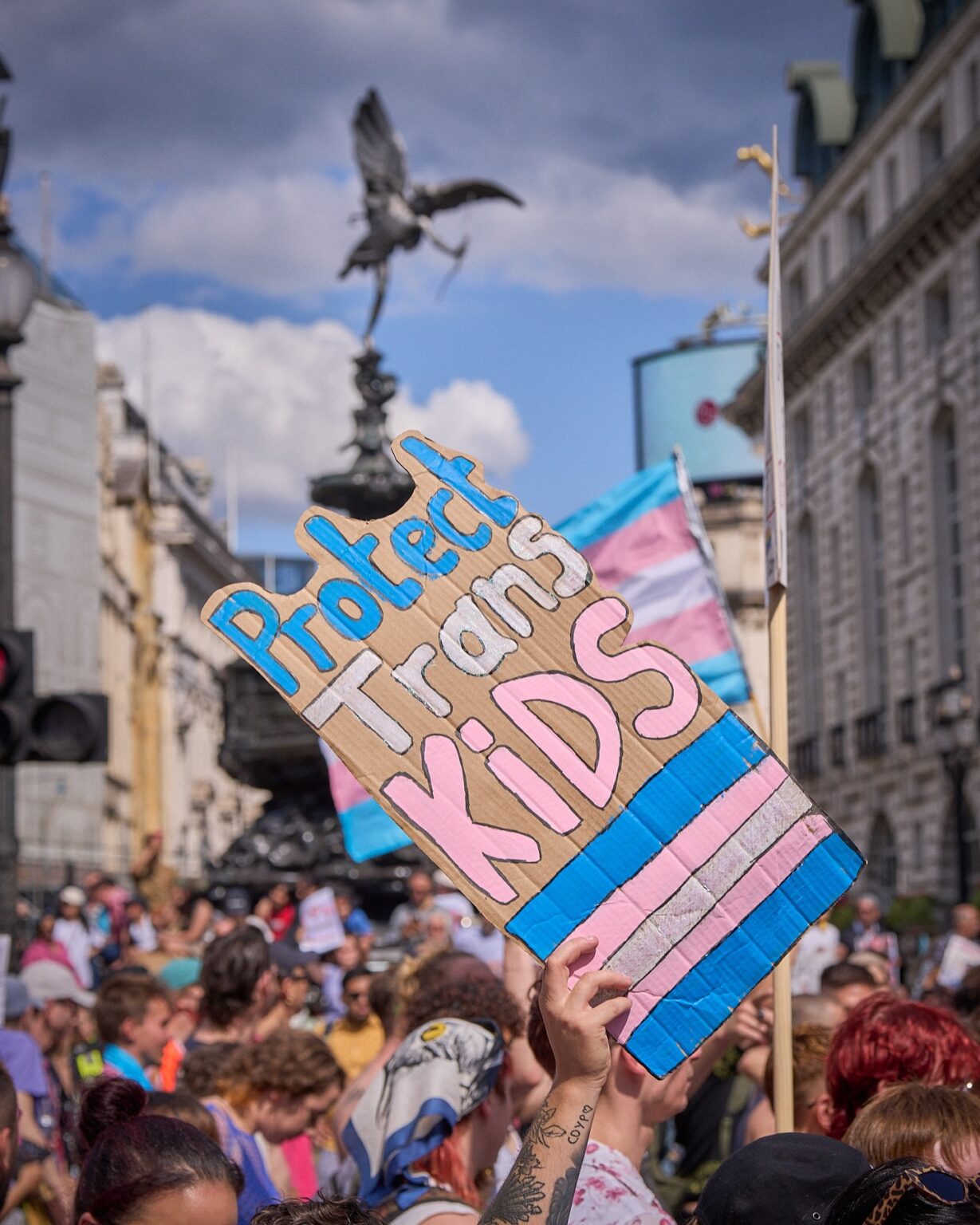
The recent decision to indefinitely ban the private prescription of puberty blockers for trans youth in the UK marks a profoundly troubling development in the ongoing struggle for the rights of trans people and access to necessary, life-saving and evidence-based healthcare.
In the UK, where no form of trans-specific healthcare is currently available for minors through the NHS and waiting lists have reached six years, the government’s decision to ban the private prescription of puberty blockers for trans youth constitutes a de facto ban on puberty blockers. This decision, which overrides years of established medical guidance and expertise, is deeply political, rooted in a divisive public discourse and misinformation rather than the recommendations of leading medical authorities. It threatens the well-being of vulnerable trans youth, whose lives depend on timely, supportive, and individualised healthcare.
ILGA-Europe, IPPF European Network, TGEU, IGLYO, and The Kite Trust call on the UK government to reconsider this harmful decision and to engage meaningfully with both the medical and scientific community and civil society groups representing the interests of trans youth and trans adults.
The framing and justification for this ban have leaned heavily on a polarised and often misleading public narrative about trans identities and related trans healthcare and epistemologically, and methodologically questionable studies about trans identities and trans-specific healthcare. Despite claims of prioritising child safety, this decision disregards the consensus of medical professionals and organisations such as the World Professional Association for Transgender Health (WPATH) and the Endocrine Society’s Clinical Practice Guideline, which have long endorsed puberty blockers as a safe and reversible option for managing gender dysphoria in minors. These treatments allow young people experiencing distress with their assigned gender to pause puberty, giving them time to better understand their needs and identity, without the added pressure of physical changes brought on by puberty.[1]
The political instrumentalisation of healthcare for trans minors has become a rallying point for anti-trans rhetoric, which often conflates all trans-specific healthcare with irreversible medical interventions. This characterisation is not only inaccurate but also deeply harmful. Puberty blockers do not lead to permanent medical transition[2] – they are a widely used and reversible treatment prescribed for various conditions, including precocious puberty.[3] By banning them for trans youth specifically, the UK government is singling out a vulnerable group for discriminatory and harmful treatment based on ideology rather than evidence.
Misinformation about the nature and effects of puberty blockers has played a significant role in shaping public opinion and policy. Opponents of trans-specific healthcare frequently cite exaggerated or unfounded claims about the risks of these treatments, ignoring the robust body of research demonstrating their safety and efficacy. Long-term studies show that puberty blockers and other trans-specific healthcare significantly reduce rates of depression and suicidality among trans youth[4] —outcomes that align with broader understandings of the critical importance of affirming care for marginalised populations.
Expert voices, including paediatric endocrinologists, psychologists, and trans health specialists, have been sidelined in favour of rhetoric that frames trans-specific healthcare as controversial. This erasure of medical expertise undermines the principles of patient-centred care and puts the health of trans youth at risk. The decision to ban puberty blockers ignores the individualised, case-by-case assessments that qualified professionals conduct before prescribing such treatments,[5] opting instead for an unyielding prohibition that strips both doctors and families of agency.
The consequences of this ban will be devastating. For many trans youth, the ability to access puberty blockers represents a lifeline. Denying them this care will force young people to undergo the changes of puberty associated with their assigned gender, exacerbating gender dysphoria and increasing risks of mental health struggles, including anxiety, depression, and suicidal tendencies. By removing a critical tool for early intervention, this decision condemns trans youth to unnecessary suffering and places an already marginalised group at greater risk of harm. Furthermore, this policy undermines the trust between trans individuals and the healthcare system. Families seeking support for their children will face increased barriers, uncertainty, and stigma, while healthcare providers may find themselves unable to offer the care they know to be best for their patients. These ripple effects extend beyond trans youth, chilling the broader provision of trans-specific healthcare and reinforcing a climate of fear and hostility.
Trans children and young people deserve safety, understanding, and access to the same standard of care afforded to their peers. Decisions about their healthcare should be guided by medical evidence and the expertise of trained professionals, not by political agendas. The indefinite ban on puberty blockers represents a failure to prioritise the rights and well-being of trans youth, and it sets a dangerous precedent for further erosion of the rights of LGBTI persons in the UK.
We urge policymakers to reconsider this harmful decision and to engage meaningfully with both the medical and scientific community and civil society groups representing the interests of trans youth and trans adults. Upholding the dignity and humanity of trans youth requires a commitment to evidence-based healthcare, free from the distortions of ideology and misinformation. Only by centering the voices and needs of trans youth can we hope to build a society that values and protects all its members.
Signatories
- ILGA-Europe
- IPPF European Network
- TGEU
- IGLYO
- The Kite Trust
[1] Cal Horton, Experiences of puberty and puberty blockers: Insights from trans children, trans adolescents, and their parents, Vol. 39(1), Journal of Adolescent Research, available at: https://journals.sagepub.com/doi/full/10.1177/07435584221100591v.
[2] Hannema et al, Endocrine management of transgender and gender diverse adolescents: expert opinion of the ESPE Working Group on Gender Incongruence and the Endo-ERN main thematic group on Sexual Development and Maturation, available at: https://pubmed.ncbi.nlm.nih.gov/39622214/.
[3] Giordano & Holm, Is puberty
delaying treatment ‘experimental treatment’?, Vol 21(2) International Journal of Transgender Health (2020).
[4] Van der Miesen et al, Psychological Functioning in Transgender Adolescents Before and After Gender-Affirmative Care Compared with Cisgender General Population Peers, Vol 66(6) Journal of Adolescent Health (2020); Olson et al, Mental Health of Transgender Children Who Are Supported in Their Identities, Vol 137(3) Pediatrics (2016); Nath, R., Matthews, D.D., DeChants, J.P., Hobaica, S., Clark, C.M., Taylor, A.B., Muñoz, G. (2024). 2024 U.S. National Survey on the Mental Health of LGBTQ+ Young People. West Hollywood, California: The Trevor Project. www.thetrevorproject.org/survey-2024.
[5] Cass, Hilary (2024), Independent review of gender identity services for children and young people: Final report, pp. 168-169, available at: https://cass.independent-review.uk/home/publications/final-report/
New regulations pose greater risks to trans people in Turkey
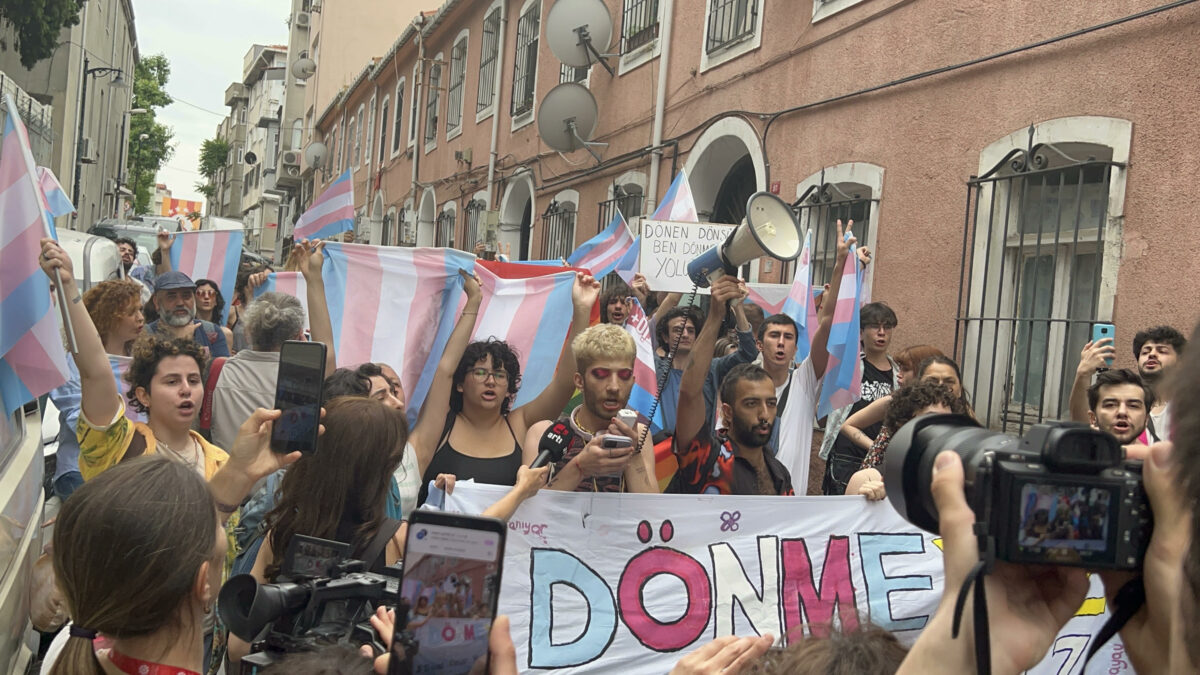
New changes from the Turkish authorities to the accessibility of hormones for trans people further threaten health and lives
On 20 November, the Turkish Medicines and Medical Devices Agency announced a new regulation that requires an e-prescription to access certain hormones used by trans people. The restrictions regulate access to hormones used mainly by trans masculine people as well as hormones used to treat diabetes. The two hormones under this new regulation used by trans women are also the same hormones used by cis women for birth control. This regulation therefore not only impacts trans people but also cis women and people with diabetes.
The new regulation exposes the pre-existing inadequacies in access of trans persons to healthcare services. While the regulation can be seen as an attempt to regularise the process of distribution and use of hormones, making the procurement and treatment safer for users, the Turkish healthcare system is extremely inaccessible for trans people, in particular as regards trans-specific healthcare. As a result, this new regulation will have severe consequences for trans people.
Currently in Turkey university research hospitals are the only hospitals that have specific gender transition councils which assess and provide a medical report for trans persons, which doctors then use to prescribe the necessary hormones. However, these hospitals are only available in 13 of the 81 provinces (usually those with major cities), resulting in those trans people living in rural areas having to travel to one of these 13 provinces. The journey time is usually long, and appointment availability is scarce, making such trips less affordable and accessible. For those who already live in major cities, it is still difficult to access the healthcare system as appointments are rarely available due to high demand – it can take several months to secure a first appointment. Subsequent appointments also have a similar waiting time. In total, it takes a minimum of six months to receive the necessary report for accessing hormone prescriptions. It is time and resource-intensive, and transphobia is often encountered along the way.
Hormones are a key part of trans-specific healthcare for many trans people – they impact not only physical traits but also frequently psychiatric health and wellbeing. For trans persons who have had their gonads removed, hormones are critical for good physical health, as stopping hormone therapy can lead to osteoporosis, among other things.
As a result, this new regulation will have severe negative consequences for the healthcare and mental health of trans people across Turkey, in particular trans masculine people and trans people in poverty. Many trans people will no longer be able to access these hormones, and some will even turn to unregulated pathways to procure them, which can result in health risks and exorbitant prices.
For such a prescription regulation to produce positive effects, the Turkish healthcare system needs to be restructured in such a way as to ensure that trans people can access healthcare in hospitals in all areas of the country. Trans-specific healthcare needs to be more widely provided and understood so that the current high demand can be met, with medical professionals ensuring the right to health of each patient, without discrimination.
More broadly, Turkey should uphold the case law of the European Court of Human Rights on legal gender recognition under Article 8. It should introduce a new legal framework that is quick, transparent and accessible with no requirements for invasive surgeries, and wide access to trans-specific healthcare. It should comply with the World Health Organisation’s 11th revision of the International Classification of Diseases which depathologises trans people in all areas of life.
Recent incidents of limitations on the right to freedom of assembly for LGBTI people in Turkey
On 20 November police blocked a demonstration to commemorate victims of transphobic violence in Ankara on the International Trans Day of Remembrance, and arrested four people, including a member of the Ankara Bar Assocation.
On 23 November police intervened in a demonstration by trans activists in Istanbul against the new e-prescription regulation, detaining 38 people. They were released after providing statements to the police.
On 25 November – The International Day for the Elimination of Violence Against Women – hundreds of people took to the streets in cities across the country, and were met with police repression in many cases. In particular, in Istanbul, the Governor’s Office banned all protests and demonstrations on the specified date, and police interventions resulted in 169 arrests. All of those arrested have since been released, apart from two LGBTI+ people from Azerbaijan, who were taken to repatriation centres. Due to the severe conditions and ill-treatment they were subjected to, including being deprived of food and medications, they were forced to “voluntarily return” to Azerbaijan. One of them was an LGBTI+ human rights defender from Azerbaijan who immigrated to Turkey due to being at risk of arrest in their country.
In Turkey LGBTI+ people are regularly subjected to arbitrary detention (often with excessive police force) and charged for participating in public events, or for holding rainbow flags in the public space. Public demonstrations are frequently banned or postponed under the pretext of “national security”, “public order”, “prevention of crime”, “protection of public health” or “public morals”, with police and governors excessive powers. These practices which include vague limitations on public assemblies allowing for arbitrary interpretation, breach Turkey’s own Constitution (Article 34) and the European Convention on Human Rights (Article 11) to which Turkey is party. Turkey should bring its practices in line with the ECHR and its own Constitution, halting arbitrary banning of protests and detention of participants.
The ILGA-Europe conference, the largest LGBTI conference in Europe and Central Asia, meets in Bucharest this weekend

The ILGA-Europe Annual Conference, the largest LGBTI conference of its kind in Europe, has brought over 400 LGBTI activists from across Europe and Central Asia to Bucharest.
Co-organised by ILGA-Europe member organisations from Romania, Accept and MozaiQ Associations, the theme of this year’s Annual Conference is ‘The Call to Courage’, reflecting the need for constant and fearless engagement in the movement for LGBTI human rights and equality. The event aims to address issues facing the LGBTI community in Europe, so that international activists can exchange experiences and discuss topics important to the movement at a European level. It also represents a crucial opportunity to strengthen solidarity and collaboration among LGBTI organisations in the region, in the context of the rise of conservative and populist movements in several European countries.
Commenting on the choice to hold the Conference in Romania this year, ILGA-Europe’s Advocacy Director, Katrin Hugendubel said: “As Romania gears up for elections, and at a time when the rights, protections and lives of LGBTI people are more at risk now than in the last decade, we are in Bucharest for the ILGA-Europe conference over with 400 LGBTI activist participants, from 52 countries. The European Courts have made two judgements saying Romania should recognise both same-sex partnerships and gender recognition that have taken place in another EU country. It is time that Romania caught up with the majority of the European Union and implemented these judgements. Romania also needs to put in place legislation to recognise partnerships and rainbow families, so that the human rights of LGBTI people can be respected and protected, instead of being used as political scapegoats with attempted legislations to limit their human rights.”
Failures in Romania
Judgements against Romania’s at the European Court of Human Rights (ECHR) and the Court of Justice of the European Union (CJEU) are among the topics addressed during the Conference, including the need to recognise same-sex families, as well as the protection of the rights of the transgender community. These topics underline both the failures of the Romanian government in protecting fundamental rights and the urgency with which these rights violations must be remedied. These challenges are amplified by an increasingly polarised political climate, where hate speech and attempts to limit minority rights are on the rise.
In addition, the conference is being held at an essential moment for Romania, given that this year is an election year. The November-December parliamentary and presidential elections will test Romanian politicians’ commitment to democratic values and respect for fundamental rights. At a time when repressive anti-LGBTI legislation from the Russian playbook is being promoted in neighbouring countries, Romania must reaffirm its commitment to the protection of all its citizens.
According to Victor Ciobotaru, Executive Director of the Accept Association Romania: “LGBTI people have never asked for special rights. We want equal rights for ourselves and our families. Politicians have probably never done this exercise of compassion of putting themselves in the other person’s shoes, in the shoes of the person you represent, to think about what it’s like to live for 25 years with someone and not have the certainty that you can be with that person in difficult moments, such as if they have health problems, if an accident occurs, or if the other person dies. These are the pressures and fears we live with every day. Every day that goes by waiting for politicians to respect our rights, is a day when real people suffer.”
Vlad Viski, the Executive Director of MozaiQ added: “We have to put a mirror in front of the political class regarding LGBTI people in Romania. There are hateful political attitudes, which are still acceptable in the Romanian Parliament and now Romania is in the situation where it is one of the last five countries in the EU that does not recognise same-sex couples, while there are judgements on partnership rights and legal gender recognition from the EU courts that are yet to be implemented.”
According to Renate Weber, Ombudsperson for Romania: “The first thing we need, and this would be a major step forward, is a civil partnership law that applies to everyone, both same-sex couples and heterosexual couples, in a non-discriminatory manner. We need this if we want people to come to terms with change.”
Political candidates for the forthcoming Romanian parliamentary elections who attended the press conference also gave comments:
“The LGBTI community does not benefit from any kind of regulation of their rights in relation to state institutions. This is discrimination. Failure to regulate social situations invites discourses that incite discrimination, exclusion and even hatred,” said Andreea Leonte, candidate on the lists of the REPER party in the parliamentary elections.
“Politicians lack courage, but they are also ignorant,” said Diana Buzoianu, USR deputy and USR parliamentary candidate. “Not seeing the injustice in front of you is a form of huge ignorance. The biggest obstacle is their mentality, that no matter what they do, no one will hold them accountable. Those in parliament are ultra-privileged.”
“There is a need for commitment, courage and solidarity,” added Florina Presada, former Executive Director of Accept and candidate on the lists of the SENS Movement for parliament. “LGBTI people need more than civil partnership, they need more than half measures. The full right is civil marriage and everything that derives from it is needed. This means protecting the family in Romania. Let’s stop operating with half measures.
“Only through joint efforts can we build a society where every individual, regardless of their sexual orientation or gender identity, feels respected and protected. It takes courage not to let hatred and discrimination become the norm, and activists from across Europe and Central Asia gathered here are a voice of solidarity and resistance against injustice.”
Joint statement: Trans children and young people in schools deserve safety and understanding
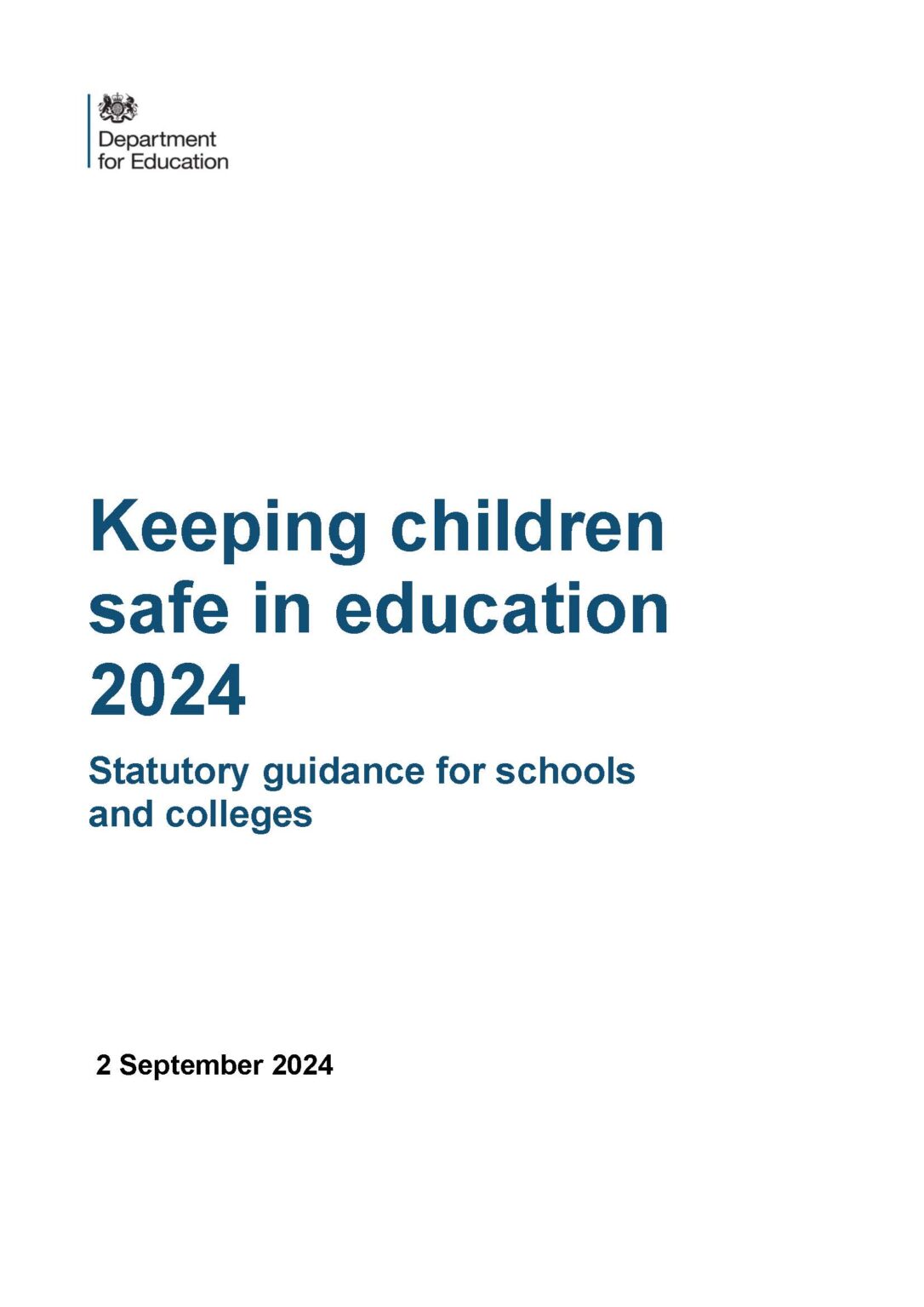
This statement was drafted by IGLYO with input from UK inclusive education experts and Members, and was endorsed by ILGA-Europe and Transgender Europe (TGEU).
We condemn the UK Statutory Guidance for Schools & Colleges and their failure to include trans and non-binary students in an affirming, supportive way.
Returning to school in September should be an exciting time for young people, catching up with friends, and new adventures ahead. Yet, trans children and young people in England continue to be targeted by exclusionary policies in education. On 2 September, the UK government published its updated legally-binding guidance for schools and colleges in England, with a section on LGBT persons that remains under review, titled “Keeping Children Safe in Education 2024”.
While we recognise the importance of providing clear guidance to schools and colleges in relation to safeguarding young people, we are concerned about the harmful and untrue narratives underlying this guidance in relation to young people’s identity. If kept in its current state, this guidance could provide a pathway to strip young trans people of their rights and agency, while perpetuating harmful stereotypes.
We are particularly concerned by the following:
- The updated guidance refers to children and young people being LGB in affirming ways but has removed parallel references for trans children and young people. We strongly condemn the government’s decision to remove trans identities from this list and its previous guidance and stress the need to reintroduce language that protects young trans people. To keep trans children safe in education, we call upon the UK government to recognise the harms of transphobia and bullying ever present in UK schools and colleges and to provide a clear framework in relation to safeguarding trans children’s well-being and identity.
- We also note with concern that the UK government continuously refuses to recognise trans identities in young people as real, conflating such terminology with ‘gender questioning’ throughout its guidance. This rejects the idea that young people can be trans. We recall that this linguistic shift was observed in other recent government guidance, including the draft schools and colleges guidance “Gender questioning children” and the “Draft Relationships Education, Relationships and Sex Education (RSE) and Health Education” statutory guidance.
- The UK government cross-references guidance that is in draft form and in consultation to reinforce its harmful messaging. There has been no response by the government to the consultation, including to concerns expressed through inputs by educators, policy experts, human rights groups, and young people themselves during the consultation.
- The “Keeping Children Safe in Education 2024” guidance uses the Cass Review as an evidentiary basis for this policy change, despite its poor and inconsistent use of evidence, pathologising approaches, and exclusion of service users and trans healthcare experts. As stated by healthcare activist and feminist researcher Dr Ruth Pearce in an article titled “What’s wrong with the Cass Review? A round-up of commentary and evidence” (2024), the Cass Review “has been extensively criticised by trans community organisations, medical practitioners, plus scholars working in fields including transgender medicine, epidemiology, neuroscience, psychology, women’s studies, feminist theory, and gender studies”.
- The “Keeping Children Safe in Education 2024” guidance recommends that families are involved in social transition in schools, despite the potential safeguarding risks of outing students to their caregivers. Research by Galop (2022), UK’s LGBT+ anti-abuse charity, noted that 2 in 5 trans or non-binary people had experienced abuse at the hands of family members, with the majority experiencing this before they turned 18 and often in relation to their gender identity. We reiterate that all young people, including trans young people, have the right to privacy, which must be respected. Trans children and young people should be supported in choosing for themselves when and how to share information about themselves with their parents or guardians. We are also concerned that the government refers to ‘exceptionally rare’ situations in which there could be a safeguarding reason to not inform parents but provides no evidence for this being exceptionally rare and no guidance for how schools decide when this risk threshold is met.
- We also stress that the guidance as it stands now recommends that schools encourage parents to seek “clinical help and guidance”, which is not only dehumanising and pathologising, it is also virtually impossible due to the UK government’s restrictions on gender-affirming care to young trans people. Parents and guardians should listen to trans children and young people and respect their identity and wishes. Not rush them off to a doctor’s office.
- We further condemn the guidance’s conflation of being trans with mental illness and autism. While some trans young people may experience mental health difficulties both as a result of transphobia and unrelated reasons, neither mental illness nor autism is intrinsic to their gender identity. We urge the government to stop scapegoating trans young people and creating further divides across communities. This is extremely dangerous and harmful to not only trans youth, but also neurodivergent and autistic youth, including those that are both trans and autistic.
On the guidance, Alex Feis-Bryce (He/him), Executive Director of our UK Member Diversity Role Models noted: “I am very concerned about the lack of clarity this update provides teachers and school leaders on their return to school and the impact it could have on trans young people. The proposed changes, that remain under review, could strip young trans people of their agency. To keep children safe in education and ensure that their right to privacy is protected, any education policy should recognise the challenges young trans people currently face in education, including bullying on the basis of their real or perceived difference, not introduce additional barriers.”
The “Keeping Children Safe in Education 2024” guidance is just another step in the deeply worrying march toward the attack against trans people in the UK. We urge our members across the Council of Europe region to take note and prepare for similar attacks in their home nations.
IGLYO, the world’s largest network for LGBTQI young people and students, and signatories of this statement ILGA-Europe and Transgender Europe (TGEU) call on the UK government and policymakers to stop fueling this moral panic against trans young people and discard dangerous changes proposed to the aforementioned pieces of guidance. Trans children are at increasing risk of isolation, alienation and violence. It’s time to get on the right side of history and protect trans children, and their human rights.
Joint statement on Italian Constitutional Court ruling on non-binary & trans persons’ rights

ILGA-Europe and TGEU welcome a judgement of the Italian Constitutional Court finding that non-binary peoples’ rights are protected under the Italian Constitution
In a judgment published last week, the Italian Constitutional Court found that non-binary peoples’’ rights are protected under the principles of social identity, equality of citizens and the right to health as guaranteed by the Italian Constitution. The Court did not, however, recognise a right to be registered as non-binary in Italian civil registries. The Court also repealed the legislative provision requiring trans people to obtain a court’s authorisation prior to accessing transition-related surgery.
ILGA-Europe and Transgender Europe (TGEU) welcome this decision but regret that the Court failed to recognise a right to a third legal gender option in Italian registries and identity documents. Our organisations submitted an amicus curiae in the case, expressing that the introduction of a third legal gender option protects the rights to self-determination, dignity and private life of many trans people, intersex people and people of other gender identities.
The decision follows a referral by a regional court on the case of a non-binary Italian citizen, raising two questions of constitutionality to the Constitutional Court.
Missed opportunity to recognise a third legal gender option in the Italian system
The first question concerned the current lack of a third legal gender option in Italian registries and identity documents.
The applicant argued that the failure to recognise non-binary gender identity harms individuals’ social identity (Article 2 of the Constitution) and equality before the law (Article 3 of the Constitution), since legal gender recognition is allowed only to those whose gender identity falls within the binary. The Court also examined a violation of the fundamental right to health under Article 32 of the Constitution, and whether the lack of recognition of non-binary gender identity compromises psychophysical wellbeing.
The Constitutional Court declared this question inadmissible, citing the wide repercussions that the introduction of a third legal gender option would have on various sectors of the legal system, which would necessitate a systemic legislative reform of the system and of the many institutions currently operating under the gender-binary logic.
However, the Court brought this question to the attention of the legislator. It noted that the lack of a third legal gender option in the Italian system can lead to unequal treatment and/or can compromise the psychophysical wellbeing of concerned individuals, which can in turn raise issues around the respect for social dignity and protection of health under Articles 3 and 32 of the Constitution.
The applicant, as well as ILGA-Europe and TGEU – Trans Europe and Central Asia in their third-party intervention, recalled that non-binary gender identity has now been recognised in numerous legal systems across Europe. Iceland and Germany are leading the way and Denmark and Malta partially acknowledge non-binary identities) [1]. A gender marker option in official registries and documents other than male or female (unspecified or third gender marker option) is an important issue for a growing number of people in trans and intersex communities. The EU Fundamental Rights Agency (FRA) found that nearly every second person in the trans community identifies outside of the gender binary, that is not (entirely) identifying as male or female [2].
The Italian Constitutional Court ruling was highly anticipated in this respect, and it could have triggered legislative changes inspiring other countries to follow suit and potentially transforming the landscape of non-binary rights in Europe.
Unconstitutionality of the obligation for trans and non-binary people to obtain judicial authorisation to access transition-related surgeries
The second question concerned the obligation in Legislative Decree no. 150 of 2011 for trans and non-binary people to obtain a court decision to be authorised to access transition-related surgical interventions.
The applicant argued that such an obligation violates the fundamental right to self-determination (Article 2 of the Constitution) and the right to equality before the law (Article 3), since requiring judicial authorisation for a medical procedure that is lawful is unreasonable. Such a requirement is also discriminatory, because other similar interventions not linked to gender identity, are left exclusively to medical judgment and to the patient’s consent.
The Court ruled that such a requirement was unconstitutional. It reiterated that for the purpose of legal gender recognition, it is necessary and sufficient to ascertain the “objective transition of gender identity” which can be accomplished through hormonal treatments and psychological-behavioural support, without a surgical intervention. As such, according to the Court, the blanket requirement for judicial authorisation before surgical interventions is manifestly unreasonable and unnecessary.
Notably, the Constitutional Court referenced the changing jurisprudential framework in Italy on this issue, highlighting the growing Italian case-law authorising surgery at the same time as ordering legal gender recognition.
Further to this ruling, trans and non-binary people in Italy will be able to obtain surgeries as part of their trans-specific healthcare without a judicial decision, a requirement that often led to arbitrary and lengthy procedures.
ILGA-Europe
TGEU (Trans Europe and Central Asia)
- As pointed out by the applicant, the EU itself provides standard forms containing three gender options Non-Binary gender identity is recognised under Regulation (EU) 2016/1191 of the European Parliament and the Council of 6 July 2016 on the free movement of citizens on promoting the free movement of citizens by simplifying the requirements for presenting certain public documents in the European Union and amending Regulation (EU) No 1024/2012
- Russell, Sanders, Watkins, Diving into the FRA LGBTI II Survey Data: Trans and non-binary briefing’, p. 3, available at: https://tgeu.org/intersecting-oppressions-trans-people-in-europe/
Trans woman should have been allowed access to hormone therapy in prison, says European Court

The European Court of Human Rights has found that Poland violated Article 8 of the European Convention on Human Rights, protecting the right to private and family life, when a trans woman was denied access to hormone therapy in prison
On July 11, the European Court of Human Rights (ECHR) passed judgement in a case concerning the refusal by Polish authorities to allow a trans woman to continue hormone replacement therapy in prison, although she had already undergone such therapy for nearly one and a half years in two previous prisons.
The Court found that the authorities had failed to justify their refusal on any reasonable grounds, and did not provide sufficient explanations as to why the treatment might have been detrimental to the applicant’s health.
To the contrary, the Court pointed out that hormone replacement therapy had beneficial effects for the applicant’s physical and mental health and that the prescribing doctors had considered it necessary and urgent for the applicant to access such care. As such, the Court concluded that the Polish authorities had failed to strike a fair balance between the competing interests at stake, especially in light of the need to protect the applicant’s health as well as her interest in continuing hormone replacement therapy.
Transgender Europe (TGEU) intervened on this case. The judgement can be downloaded here.
What European countries might soon start recognising non-binary people?

Interested in the current state of non-binary rights in Europe? This concise guide covers the most important updates and developments you should be aware of
Current situation
As of 2024, only a few European countries officially recognise non-binary gender markers. Iceland and Germany lead the way, allowing non-binary people to have their identities legally acknowledged. Denmark and Malta partially acknowledge non-binary identities, though issues remain, particularly in areas like the healthcare sector. You can read more about it in one of our previous blogs. However, progress is slow, and many countries still lack comprehensive legal frameworks for non-binary recognition.
Which countries are next?
France and the SNCF case: potential impact across the EU
Last Thursday (July 11, 2024) the Advocate General of the Court of Justice of the European Union (CJEU) gave his opinion that France’s national railway company SNCF should stop forcing passengers to choose between the civil titles “Mr” or “Ms” when purchasing train tickets. This landmark case, brought by Association Mousse, could set a precedent similar to the Deutsche Bahn case in Germany across the European Union.
In his opinion, which was published earlier this week, the Advocate General of the CJEU said that it is not “necessary” and that it is therefore unlawful for the SNCF to collect individuals’ civil titles. The Advocate General also agreed with Association Mousse that processing data on civil titles creates a risk of discrimination on the grounds of gender identity for trans and non-binary people notably as other States legally recognise non-binary identities.
Should the CJEU’s judgement align with the opinion of the Advocate General, all organisations collecting gender markers would be forced to stop doing so when it is not necessary for the service provided. The outcome has the potential to influence broader European standards for non-binary recognition, emphasising the role of strategic litigation in advancing rights.
Belgium’s legal hurdles
Belgium’s journey towards non-binary recognition has faced significant setbacks. In 2019, the Belgian Constitutional Court declared the existing laws discriminatory towards non-binary people. The government proposed removing gender markers from ID cards entirely, but this reform has stalled due to political and technical challenges. Despite these obstacles, there are plans to eventually implement these changes.
Italy on the verge of change
Italy is also nearing a significant decision. The Italian Constitutional Court is expected to rule on the inclusion of a third gender marker. This ruling could trigger legislative changes, inspiring other countries to follow suit and potentially transforming the landscape of non-binary rights in Europe.
Legal battles play a pivotal role in the fight for non-binary recognition. Cases like the ones in France and Germany highlight how litigation can drive change even when legislative processes are slow. These legal battles and proposed reforms are part of a broader movement toward inclusivity and respect for non-binary identities across Europe.
Beyond laws: the experience of being a non-binary person in EU
The third EU LGBTIQ survey report, published in June by the European Union Fundamental Rights Agency (FRA) offers some insights into non-binary lives. Almost 20% of respondents identified as non-binary, yet more than 90% do not have their identity legally recognised. When delving into the reasons behind this, it becomes evident that non-binary people face unique challenges and perspectives.
The reluctance or perceived lack of necessity for legal gender recognition (LGR) among non-binary people is often due to the accessibility and relevance of existing LGR frameworks. These frameworks typically do not include non-binary options, which discourages non-binary people from pursuing LGR.
For instance, while nearly 60% of trans women and men intend to seek legal gender recognition in the future, only 17% of non-binary respondents share this intention. This disparity suggests that non-binary people might not see current LGR options as applicable or beneficial to their identities, especially considering the potential discrimination they might face in the process.
Additionally, safety concerns significantly impact the daily lives of non-binary people. The FRA data revealed that 23% of non-binary people frequently hide their gender identity for safety reasons, a higher percentage compared to 10% of trans men and slightly more than trans women at 20%. This heightened sense of vulnerability underscores the pressing need for legal recognition and protection.
What do non-binary people want from the law?
Despite developments in Europe and farther afield, we still have relatively little data on what non-binary people want from the law and how they are currently experiencing different legal systems. This is something which ILGA-Europe, along with other civil society partners and a team of academics, will be looking to explore over the coming year. By understanding and addressing the specific challenges faced by non-binary people, we can better advocate for their rights and recognition across Europe.
Here is a list of useful resources for policy-makers and activists on the topic of non-binary rights:
- Rainbow Map: Legal gender recognition
- Human Rights and Gender Identity and Expression: Issue Paper by the Council of Europe Commissioner for Human Rights
- Non-binary gender registration models in Europe: Report on third gender marker or no gender marker options by Lena Holzer for ILGA-Europe
- Intersections – Diving into the FRA LGBT II Survey data: Trans and non-binary briefing by ILGA-Europe and TGEU
Joint Statement welcoming European Court ruling that Russia’s trans parent’s foster-care termination violates family rights
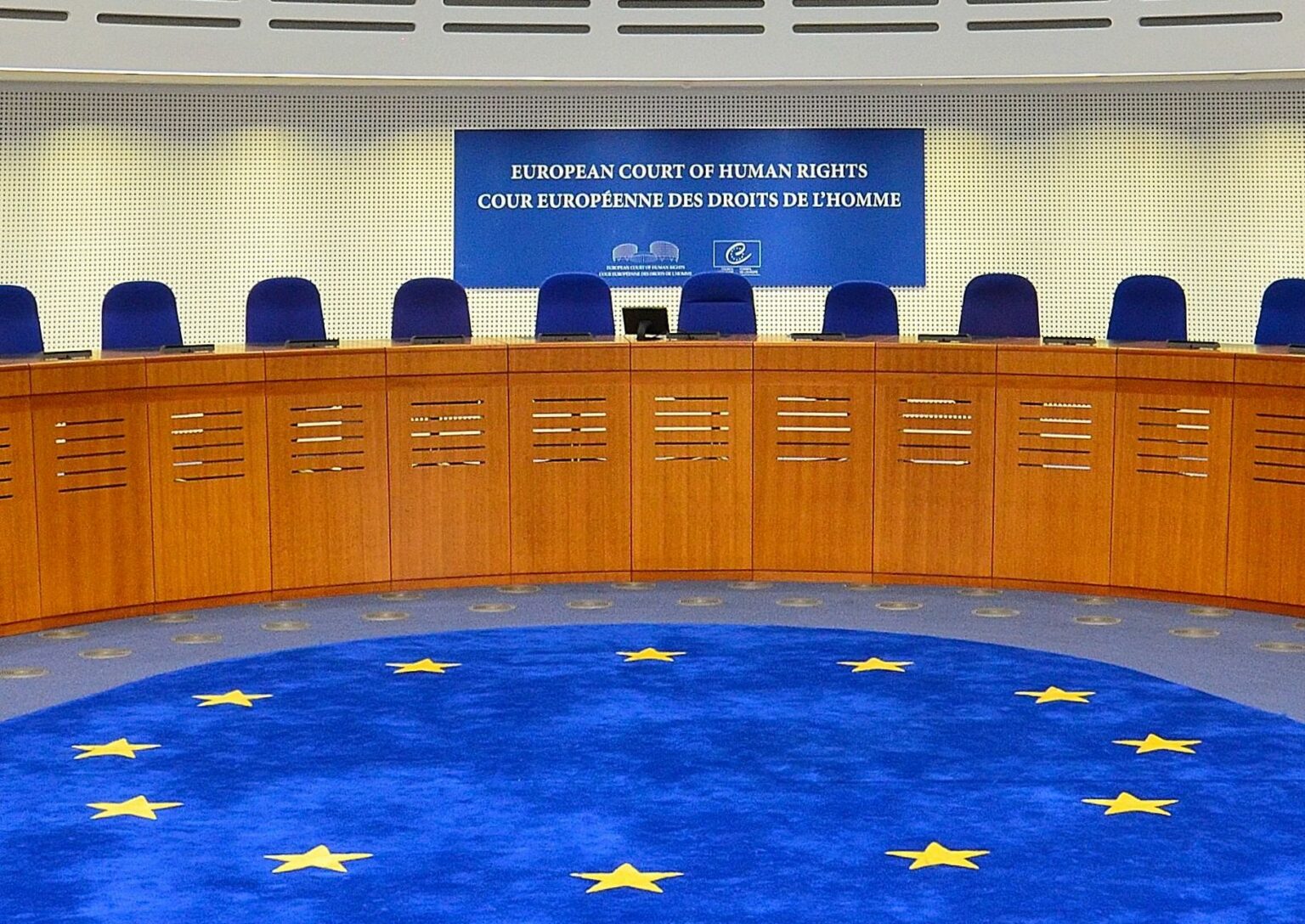
In a judgement published yesterday, the European Court of Human Rights found that Russia violated the right to private and family life of a trans man and his two foster children by terminating the foster care agreement on grounds of the man’s transition.
TGEU, ILGA-Europe, and the Irish Council for Civil Liberties, on behalf of nine fellow members of the International Network of Civil Liberties Organizations (INCLO)*, express relief over this decision. However, we regret that the Court failed to examine and rule on an apparent discriminatory motive.
The case concerned a Russian transgender man whose two foster children were removed from his home on account of his gender identity and transition.
Violation of the rights to private and family life
The European Court of Human Rights addressed issues under Article 8 regarding family life. The case involved the termination of custody and a foster care agreement of a trans man (and his husband) caring for two children, due to his diagnosis of “transsexualism” and change of gender identity. The Russian authorities primarily based their decision on the fact that under Russian law it is impossible for same-sex couples to be foster parents. Also, they cited societal traditions and mentality for the interference. The European Court however criticised that the overall family situation was not examined in full, nor were the conclusions of investigating authorities considered.
The Court criticised the lack of an individualised expert examination or scientific study on the impact of gender identity changes on children’s psychological health and development. Additionally, the assessment was not balanced or reasonable regarding the competing interests involved. The Court also concluded that under Article 34 ECHR, the applicant had standing to represent the children’s interests because, at the time the application was filed, social services that were meant to be safeguarding the children’s interests were responsible for the wrongful actions in the first place. The Russian government denied this.
A question of discrimination?
The applicant also alleged a violation of his right to non-discrimination, as protected by Article 14 ECHR. Unfortunately, the Court did not consider it necessary to explore this argument and concluded that the finding of a violation of Article 8 ECHR was sufficient. However, Russian authorities terminated the applicant’s custody exclusively on account of the gender identity of the trans man and his decision to transition, as chamber member Judge Serghides rightly pointed out in a partly dissenting opinion to the judgement. Therefore, it is incomprehensible why the complaint under Article 14 ECHR (non-discrimination) combined with Article 8 ECHR was not fully investigated. This is a missed opportunity to develop jurisprudence on Article 14.
TGEU, ILGA-Europe, and TLDP as well as the Irish Council for Civil Liberties, on behalf of 10 INCLO members, have respectively submitted comments in the case at the time.
What this means for trans foster parents and their families
Russia left the Council of Europe on 16 September 2022. Therefore, the country is no longer bound by the European Convention on Human Rights. However, cases that were pending at that point are still heard by the European Court of Human Rights.
Technically, Russia is still bound to implement cases that are dated before Russia left the Council of Europe. However, in practice it is highly unlikely that trans people in Russia will benefit from the judgement as Russian authorities tend to ignore judgements from the ECtHR, even more so if they relate to LGBTI people.
However, since the judgement is also relevant for the remaining member states, trans foster parents and their families in 46 States of Europe can refer to this judgement.
*The endorsing INCLO members are: American Civil Liberties Union (ACLU); Canadian Civil Liberties Association (CCLA); Centro de Estudios Legales y Sociales (CELS); Centro de Estudios de Derecho, Justicia y Sociedad (Dejusticia); Human Rights Law Network (HRLN); Hungarian Civil Liberties Union (HCLU); Irish Council for Civil Liberties (ICCL); Kenya Human Rights Commission (KHRC); KontraS (Commission for the Disappeared and Victims of Violence); Legal Resources Centre (LRC).
More info
Remarkable and resilient Prides across Europe
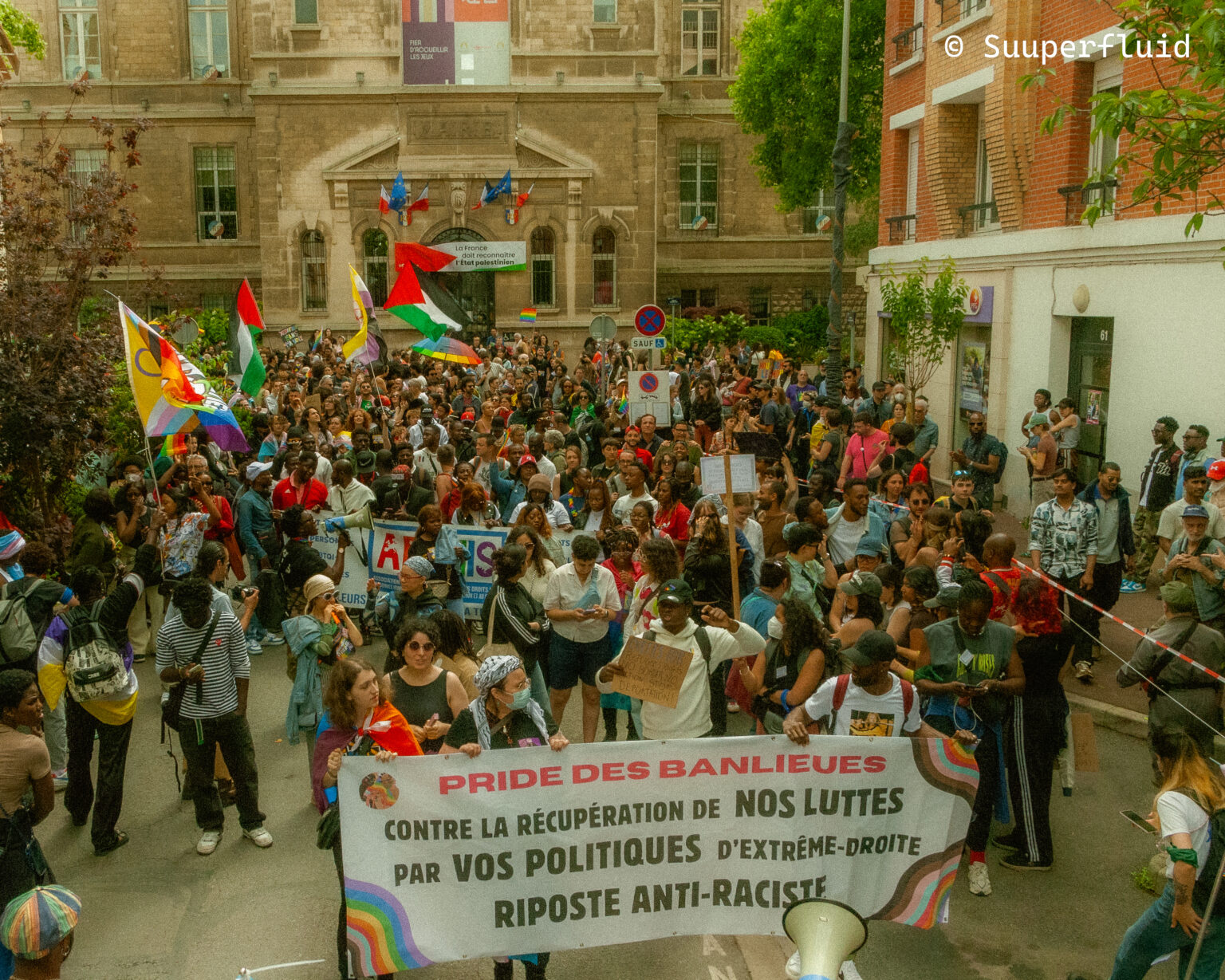
Amid political turmoil, war, social issues and cultural changes, Pride celebrations in Europe continue to demonstrate the resilience and determination of LGBTI communities
Today, on the eve of EuroPride in Thessaloniki, we are highlighting a number of significant Pride events on the continent, and one clear message shines through: LGBTI people are persisting in asserting their right to assemble and freely express themselves, thereby firmly establishing their presence in society. Pride events not only celebrate identity and diversity but also serve as critical platforms for political engagement. They amplify the voices of LGBTI people across Europe, who continue to push boundaries and demand their rightful place in society. Here are just a few of the thousands that have and will happen across Europe this year, in places where challenges are acute.
Kyiv Pride, Ukraine
Kyiv Pride 2024, on June 16, took place amidst challenging circumstances, reflecting the determination of Ukraine’s LGBTI community. Despite facing a cap on participation and heightened security measures, over 500 people marched through the streets of the capital to advocate for partnership recognition and protections against hate crimes. The event occurred against a backdrop of ongoing war, underscoring the urgent need for legislative reforms to safeguard LGBTI rights in Ukraine. Despite tensions and counter-protests, Kyiv Pride 2024 stood as a powerful assertion of the community’s right to freedom of assembly and expression.
“We took only a few steps, we made this painful compromise for the sake of safety and in order to revive the tradition and make a powerful and open Kyiv Pride March next year.” – Anna Sharygina, lead organiser of KyivPride.
La Pride des Banlieues (The Pride of the Suburbs), La Courneuve, France
La Pride des Banlieues happened in La Courneuve on June 22, representing LGBTI people from French working-class areas, many of whom are racialised. The group has been organising the Pride for several years in Saint-Denis. This year, however, the municipalities denied permission to march in Saint-Denis because of preparations for the Olympic Games in the city. Due to a last-minute relocation from its original venue and losing support from a municipality that had previously been an ally of past La Pride des Banlieues marches, the event took place in another suburb of Paris with less resources for security and less time to figure out new support infrastructure.
It was important that La Pride des Banlieues took place this year as the far-right opposition has been gaining more traction in France, getting more intense in their actions against LGBTI communities, with racialised LGBTI communities particularly facing multiple situations of discrimination and harassment. In their political message at La Pride des Banlieues, the organisers and their constituents condemned rising hate speech, discriminatory immigration policies, and institutional racism, aiming to resist far-right co-optation and mobilise solidarity against oppression of ethnic minorities and LGBTI communities in the suburbs.
“The fight against the far-right cannot be reduced to a universal fight, we must recognise the multiple and interconnected realities of oppression.” – La Pride des Banlieues organisers.
Trans Pride Istanbul, Turkey
Trans Pride Istanbul on Sunday June 23 was marked by decentralised actions across the city. Under the theme “Perpetrator State,” participants asserted trans visibility and existence, refusing to be silenced despite bans and oppression. Rather than a centralised march, activists mounted a number of smaller, unannounced activities like hanging trans flags, projecting messages across city landmarks and reading of a statement in front of Pride attendees. The event unfolded amidst stringent security measures, including metro station closures and a heavy police presence. Two people were detained and released after. This year’s Trans Pride Istanbul not only showcased solidarity and determination among Turkey’s trans community but also highlighted ongoing issues of discrimination and the fight for visibility and rights, echoing their message that the state is accountable for perpetuating violence and systemic injustices against trans people.
“We are trans people who are made the targets of violent and discriminatory policies at any chance given just because of our trans identities.” – Trans Pride Istanbul organisers
Looking Ahead
As we approach the end of June, two more significant events lie ahead this weekend.
Bucharest Pride, Romania
More than 25,000 people are expected to take to the streets of Bucharest on Saturday, June 29 to celebrate diversity and claim the rights of the LGBTI community at a crucial moment in Romania. Both presidential and general elections are approaching, and 20% of Romanian MEPs elected to the European Parliament were from the far right, with two of them using anti-LGBTI hate speech. Additionally, a new referendum regarding the definition of families is being pushed by the government opposition.
Pride in Bucharest will address the urgent need for legal recognition and protection of all same-sex families, continuing the push for the immediate implementation of the 2018 Coman case. In the case, the European Court of Justice affirmed residency rights in EU countries (that do not recognise same-sex unions) for the spouse of an EU citizen exercising their right to freedom of movement. Romania has yet to implement the verdict by granting Andrew Coman’s husband a residence permit, and a draft law has been adopted that would stop Romania from implementing it.
ILGA-Europe will be in Bucharest this coming October for their Annual Conference, working with local hosts ACCEPT and MozaiQ, recognizing this as a crucial moment for LGBTI human rights in Romania.
Istanbul Pride, Turkey
Istanbul Pride will take place on Sunday, June 30. Given the government and police response to Pride in the country over the past years, we will be closely monitoring what is happening. One thing we do know is that the LGBTI community in Istanbul and their allies will assert their human right to freedom of assembly and freedom of expression by attending Pride, with pride, resilience and courage. We will be reporting on Istanbul in this year’s instalment of our Turkey Pride monitoring blog over the coming weeks, as we learn from activists and organisers how officials are responding to Prides across the country. You can read our Turkey Pride monitoring blog from 2023 here.
Joint Statement: Milestone for trans and intersex rights in Europe
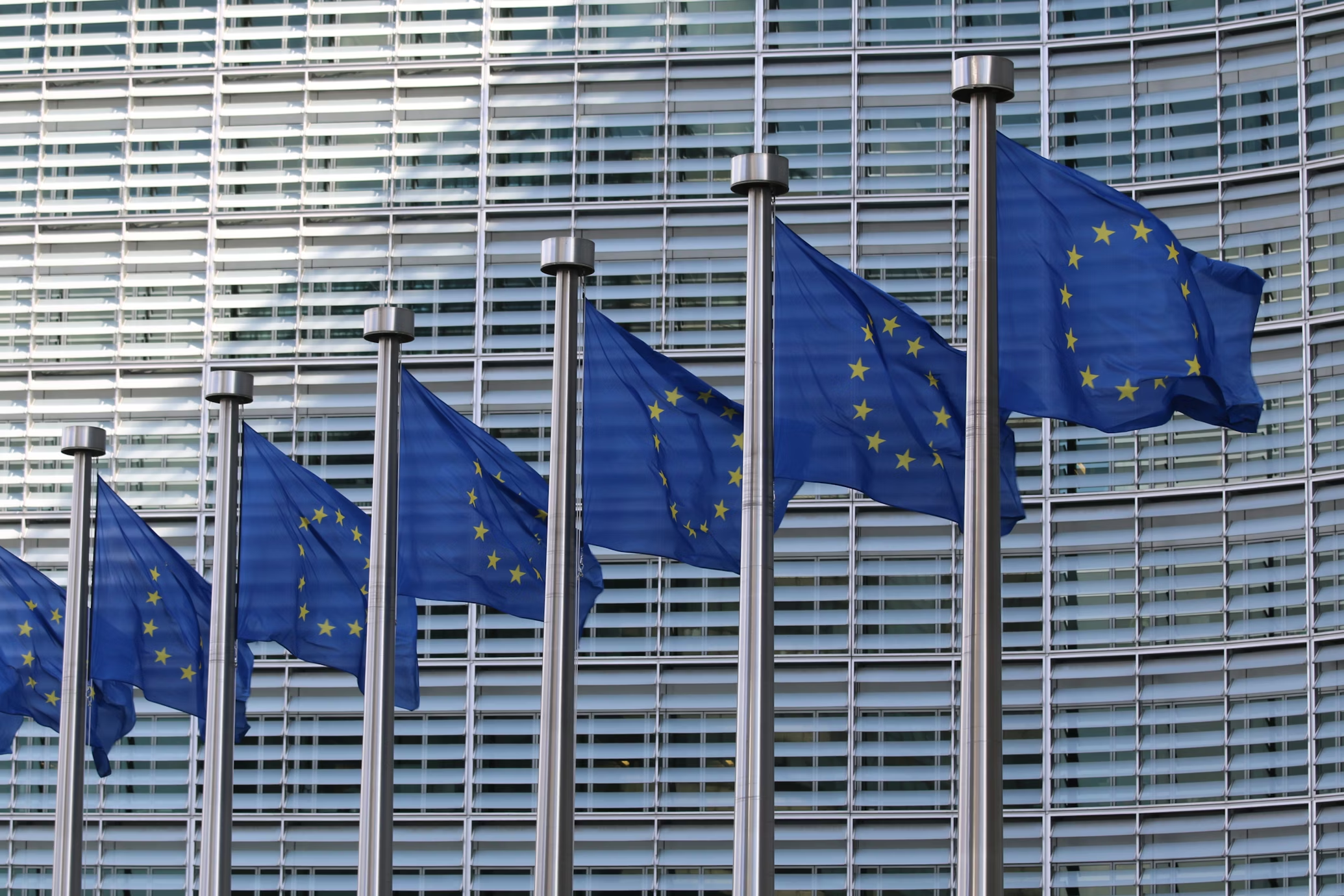
ILGA-Europe, TGEU, OII Europe, IGLYO and EL*C jointly welcome the inclusion of SOGIGESC grounds in new EU Directive on minimum standards for equality bodies
On 7 May 2024, two new directives on minimum standards for equality bodies were officially adopted by the EU. One of the directives includes in its recitals and articles the grounds of gender expression, gender identity and sex characteristics in addition to sexual orientation. This marks the first time sex characteristics have been mentioned explicitly in an EU directive, and the second time gender identity and gender expression have been mentioned in an EU directive.1 This is an important milestone for the protection of LGBTI people in EU legislation, and follows two years of joint advocacy on these directives by OII Europe, TGEU, ILGA-Europe, EL*C and IGLYO.
The two new directives amend existing EU laws in order to add provisions to strengthen the role and independence of equality bodies in the EU, setting minimum standards regarding their mandates, tasks, independence, structure, powers, accessibility and resources. Both directives are subject to EU primary law including the Treaties and the Charter of Fundamental Rights (CFR). Article 19 TFEU and Article 21 CFR include sexual orientation in the list of protected grounds against discrimination, therefore both new directives cover the grounds of sexual orientation as regards the mandates of equality bodies in the EU.
However, we need to go beyond this to properly address the reality of discrimination. Limiting equality bodies’ mandates to working only on the grounds of discrimination explicitly named in the EU treaties means that many causes of discrimination are left out, remaining unrecognised and therefore not properly addressed. In the case of LGBTI people, who face discrimination based on their sexual orientation, gender identity, gender expression or sex characteristics (or a combination of these grounds), not including gender identity, gender expression and sex characteristics in the mandates of equality bodies means that equality bodies cannot properly address discrimination faced by trans and intersex people. In a time when discrimination against LGBTI people is on the rise, this is a welcome move.
Together, OII Europe, TGEU, ILGA-Europe, EL*C and IGLYO advocated for references to the grounds of gender expression, gender identity and sex characteristics to be included in both new directives.
Directive 2022/0401 amends directives in the field of equal treatment between persons irrespective of their racial or ethnic origin, equal treatment in matters of employment and occupation between persons irrespective of their religion or belief, disability, age or sexual orientation, equal treatment between women and men in matters of social security and the access to and supply of goods and services. This new directive required unanimous agreement in the EU Council. Despite references to gender identity, gender expression and sex characteristics being included in the text proposed by the European Parliament, due to opposition from a small number of EU countries, these references did not make it into the final text.
However, for the second Directive, the references did make it into the final agreed text. Directive 2022/0400 amends existing Directives 2006/54/EC and 2010/41/EU which cover the implementation of the principle of equal opportunities and equal treatment of men and women in matters of employment and occupation, including self-employment. This directive required qualified majority voting in the EU Council. Therefore, the references to the grounds of gender identity, gender expression and sex characteristics were included in the adopted text, in the context of the definition of a victim of discrimination:
Recital 23
“In addition to prevention, a central task of equality bodies is to provide assistance to victims of discrimination. Victims should be understood to encompass all persons who consider that they have experienced discrimination as referred to in Article 4 of Directive 2006/54/EC or in Article 4 of Directive 2010/41/EU, irrespective, for example, of their socio-economic status, political opinion, age, health, nationality, residence status, language, colour, level of literacy, gender, gender identity, gender expression or sex characteristics.”
Article 6
“Member States shall ensure that equality bodies are able to provide assistance to victims as set out in paragraphs 2 to 4. For the purposes of this Directive, ‘victims’ mean all persons, irrespective, for example, of their socio-economic status, political opinion, age, health, nationality, residence status, language, colour, level of literacy, gender, gender identity, gender expression or sex characteristics, who consider that they have experienced discrimination within the meaning of Article 4 of Directive 2006/54/EC or Article 4 of Directive 2010/41/EU.”
What’s next?
This achievement marks a milestone in the recognition of trans and intersex people in EU legislation and policy-making, and will contribute to further protection against discrimination for LGBTI people by equality bodies across the EU. We also extend our thanks to Equinet, the European Network of Equality Bodies, which led a successful campaign on these directives and supported our calls for the inclusion of the grounds of gender identity, gender expression and sex characteristics, based on the reality of discrimination against LGBTI people in the EU, as well as existing EU policy, legislation, and decisions of the EU Court of Justice. We will now work together with relevant authorities on the effective transposition of the equality bodies directives and we will continue to advocate for more comprehensive protection for LGBTI people in EU policy and legislation.
European court hears landmark case on trans rights in Hungary
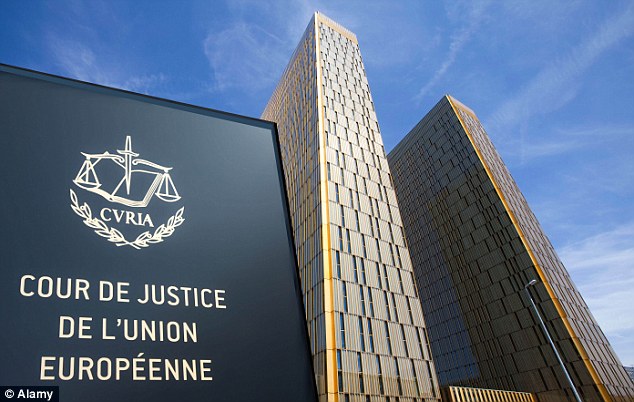
The Court of Justice of the European Union held a significant hearing today concerning legal gender recognition for trans people in Hungary
Today, the Court of Justice of the European Union (CJEU) heard the case Deldits (C-247/23), which involves a trans refugee in Hungary who has been denied legal gender recognition (LGR) since 2021. Represented by Háttér Society and the Hungarian Helsinki Committee, the complainant, who was granted refugee status Hungary in 2014, has sought judicial review under Article 16 of the EU’s General Data Protection Regulation (GDPR).
This case raises crucial questions for the CJEU: whether GDPR mandates the rectification of personal data, including gender marker, upon request; what evidence is necessary to support such requests; and whether medical or surgical interventions must be proven.
In addition to the European Commission and advocacy groups, the governments of Hungary, France, Spain and the Netherlands participated in today’s hearing, highlighting its broader implications for LGR in Hungary.
The Budapest-Capital Regional Court’s referral to the CJEU marks a pivotal moment in the ongoing battle for trans rights in Hungary. Despite the 2018 Constitutional Court decision and the 2020 European Court of Human Rights judgement affirming these rights, the Hungarian legislature has yet to implement necessary changes. LGR for both refugees and Hungarian citizens has been banned since 2020.
According to Katrin Hugendubel, Advocacy Director at ILGA-Europe: In its final judgment, the CJEU will have the opportunity to address the discrimination faced by trans EU citizens when a gender marker that does not correspond to their gender identity is recorded in the national registrars. The case is of the utmost importance to protect the rights of trans citizens in Hungary and across the EU, notably in the context of the Hungarian ban on legal gender recognition.
The opinion of the Advocate General is expected on 12 September 2024. The CJEU’s decision is anticipated later in the autumn, and it holds significant potential to influence the legal framework for trans rights within Hungary and the broader EU.
ILGA-Europe, alongside Transgender Europe (TGEU), are providing support to Háttér Society in this case.
Read the press release by Háttér Society here.
A new roadmap for advancing the human rights of trans and non-binary people
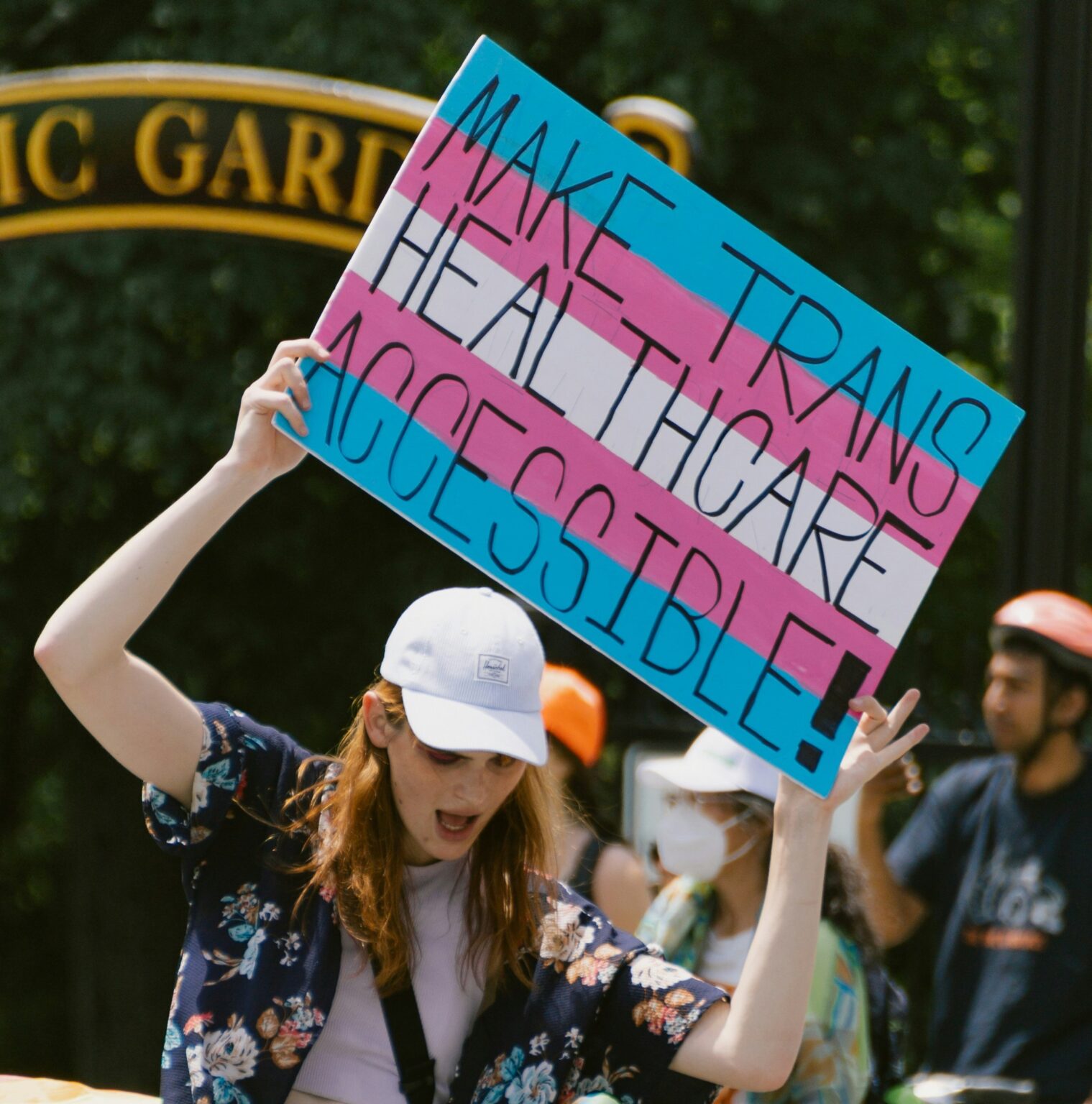
A brand new Issue Paper from the Council of Europe on Human Rights and Gender Identity and Expression not only sheds light on the challenges faced by trans and non-binary individuals across Europe and beyond, but also serves as a comprehensive tool for advocacy activism
The Council of Europe (COE) Commissioner for Human Rights, Dunja Mijatović, has released a new Issue Paper which thoroughly examines the challenges faced by trans and non-binary people across Europe. The Paper includes a wide range of insights, recommendations and analysis, offering a comprehensive overview of the landscape of the rights of trans and non-binary people in Europe and beyond.
The Paper includes 15 recommendations aimed at policymakers, legal professionals, civil society organisations, and other stakeholders, providing a clear roadmap for advancing the human rights of trans and non-binary people. These recommendations cover a wide range of demands activists have had for decades and cover a spectrum of directions, from fundamental reforms in legal recognition procedures, such as the removal of diagnosis and sterilisation requirements, to policy changes aimed at fostering greater inclusivity and respect for gender diversity, such as the call for the inclusion of non-binary gender markers on identity documents.
A dynamic new tool for change
This paper signals a renewed commitment of the COE to protecting the rights of trans and non-binary individuals, however, it is much more than that. It’s also a dynamic tool that provides a roadmap for advocacy efforts for legislative change. The 13 sub-chapters within the paper offer comprehensive analyses and recommendations, serving as robust advocacy tools in themselves, under these helpful headings:
• Enjoyment of human rights
• Equality and non-discrimination
• Gender identity and gender expression conversion practices
• Legal gender recognition
• Violence, hate crimes and hate speech
• Detention
• Family life
• Education
• Sport
• Employment
• Poverty and housing
• Healthcare
• Sanitation
• Asylum
Each sub-chapter is equipped with a wealth of references to human rights instruments, various studies, and laws, providing a solid foundation for advocacy work.
Let’s take recommendation No ’8 as an example:
Ensure that national laws prohibit discrimination due to gender identity and gender expression in all decisions relating to family life, including birth registration rules, custody, adoption and access to assisted reproductive technologies. When birth registration systems are gendered, trans people should be registered as parents in accordance with their gender identity, and alternative systems should continue to be explored to reflect the growing diversity of families.
Activists who have work on family rights for trans and non-binary people among their advocacy goals can go to chapter 2.6 in the paper, entitled Family Life. There are three subsections in the chapter: Parenthood, Parental status, and Trans families across borders. Each has references to case law or legal drafts and represents the Commissioner’s selection of arguments and resources that are most beneficiary to the cause.
In total, the paper includes 269 references, linked throughout. This not only demonstrates the depth of research underpinning the Issue Paper but also serves as a testament to its credibility and relevance in advocacy activism.
Powerful trans-inclusive terminology
The Paper also introduces a strong range of trans-inclusive terminology, ranging from “gender fluidity” to “non-binary identities,” thereby contributing to the normalisation and visibility of marginalised experiences. By embedding such terminology within a human rights framework, the paper not only validates the lived experiences of gender minorities but also challenges societal norms and stereotypes.
Consider the term “self-determination”, a concept prominently featured in discussions surrounding Legal Gender Recognition. This term, while commonplace in LGBTI activism discourse, holds profound implications for trans and non-binary individuals seeking autonomy over their gender identity. By unpacking such terminology within the Issue Paper, activists are equipped with the language and concepts necessary to articulate their demands and navigate legal and policy frameworks.
The importance of recognition
While LGBTI activists are intimately familiar with the gaps in trans and non-binary rights, it is of great importance that they are recognised and shed light upon in a forward-thinking paper from a human rights institution of such great influence, giving them further visibility across other movements and audiences. Through its comprehensive research, inclusive terminology, and actionable recommendations the Issue Paper on Human Rights and Gender Identity and Expression has every chance of contributing to our collective action in the advancing human rights of trans and non-binary people.
You can read the Issue Paper on Human Rights and Gender Identity and Expression here
New draft law in Hungary seeks to exculde trans women from pension benefits
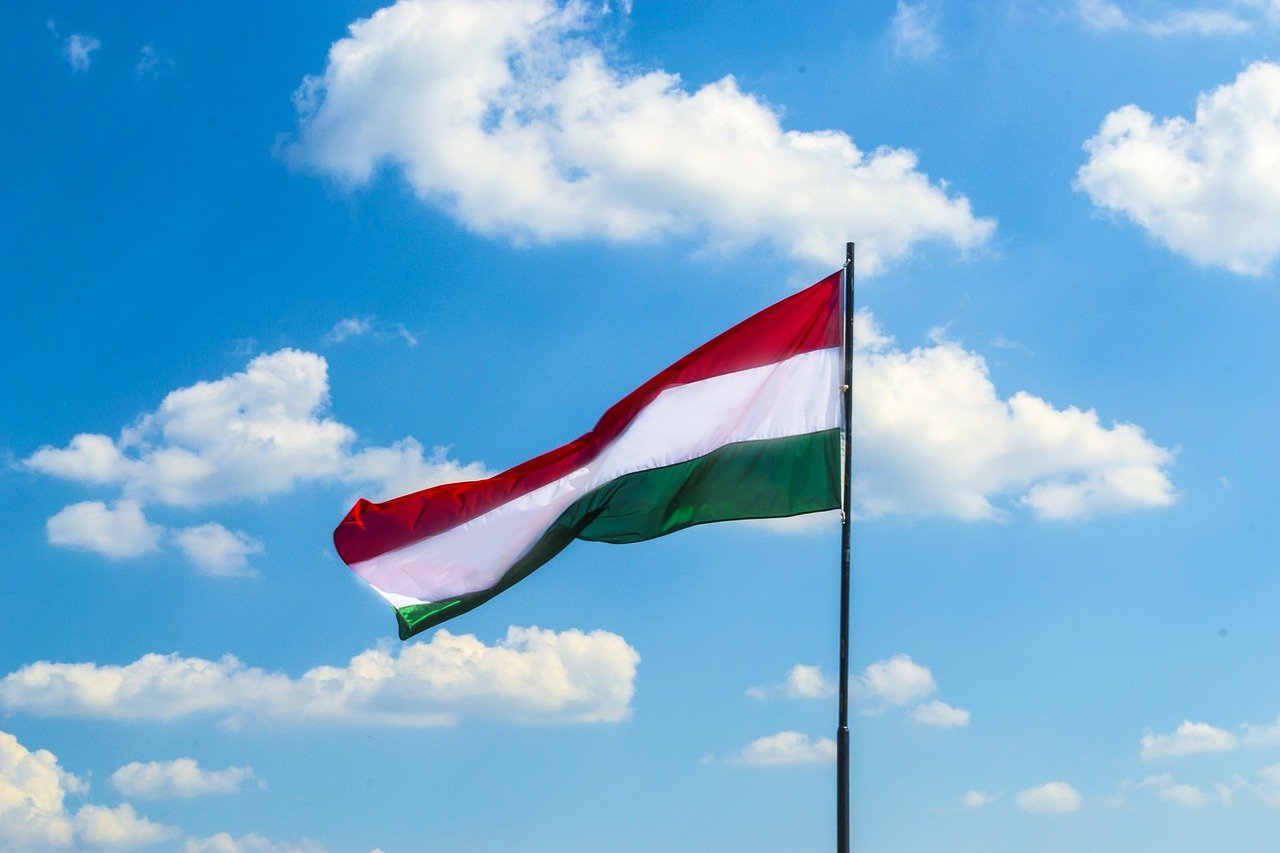
Alongside the Hungarian LGBT organisation Háttér Society, we have written to the President of the EU, Ursula von der Leyen, alerting her to the recent introduction of a new bill to further curtail the rights of transgender people in Hungary and of the intensification of the enforcement of the so-called “child protection law”. Read the letter below.
Dear President of the European Commission,
We are writing concerning the recent introduction of a new bill in the Hungarian Parliament to further curtail the rights of transgender people in Hungary and of the intensification of the enforcement of the so-called “child protection law”.
On July 13, 2023 two Members of Parliament from the FIDESZ and KDNP parties (both Ministers in the Cabinet of PM Orbán) submitted a new bill in Parliament[1] to exclude trans women from accessing pension benefits available only for women. The bill was a direct response to a court case in which the Veszprém Regional Court ruled that a transgender woman who had her gender legally recognized in 2013 is to be entered into the pension registration system as a woman and shall be entitled to the “Women 40” pension benefit.[2] The “Women 40” pension benefit was introduced in 2011, and allows women to retire after 40 years of employment even if they have not reached the general pension age. The court decision relied on a case of the Court of Justice of the European Union from 2006[3] which found that a transgender women – who in accordance with the conditions laid down by national law – have undergone male-to-female gender reassignment are entitled to retire under the same conditions as women whose gender identity corresponds to their sex at birth. The European Court of Human Rights arrived at the same conclusion.[4]
The new provisions proposed in the bill would apply to pending and repeat procedures as well. The explanatory memorandum of the bill is not only blatantly transphobic, but it distorts the text of the Fundamental Law to support the legislative agenda: it claims that the Fundamental Law mandates the registration of the sex at birth (or the so-called “biological sex”) only, whereas this rule is actually contained in the Act on Registry Procedures, not in the Fundamental law. It goes further, arguing that such solutions – i.e. that trans women enjoy the pension benefits reserved for women – would be unimaginable even in the most liberal countries.
The new legislation would apply only to a few trans women, since the Hungarian Parliament banned legal gender recognition for trans and intersex people in May 2020. A preliminary ruling was requested by a Hungarian judge on the compatibility of the resulting lack of legal gender recognition with GDPR, the court case is currently pending.[5]
The Hungarian Parliament is again reacting with brute force to a court decision that goes against their ideological narrative: instead of simply complying with it, the Parliament overrides the judgment of a court by passing amendments that will close the path for similar future decisions. This reactionary law-making defeats the principle of separation powers, and seriously violates the rule of law and the standards deriving from it. Furthermore, the new provision applies to trans women who had their gender legally recognized years, even decades ago in any future pension procedures, as well as in any pension procedures currently pending or being repeated due to court decisions. This is retroactive legislation which also violates the rule of law. The bill would not only go against international human rights standards, but is a clear violation of the case law of the Court of Justice of the European Union.
We ask the Commission to call the attention of the Hungarian Government to the uncontested case law of the Court of Justice of the European Union, and warn the Hungarian Government that the adoption of such a legislation would have serious consequences with regards to the Commission’s assessment of the Government’s commitment to improve the rule of law in Hungary. We also ask the Commission to closely monitor the Parliamentary debate of the legislation, and in case the legislation is adopted, initiate promptly an infringement procedure.
We would also like to call your attention to the intensification of the enforcement of the so-called “child protection law”[6] in recent months. Act no. LXXIX of 2021 amended several legislations with provisions to ban access of minors to content that “propagates or portrays divergence from self-identity corresponding to sex at birth, sex change or homosexuality”. Its implementing legislation[7] was also amended to require that “products intended for children that (…) propagate or portray divergence from self-identity corresponding to sex at birth, sex change or homosexuality shall be only sold separately from other products only in closed packaging.” The Commission launched an infringement procedure concerning the legislation; the case is currently pending before the Court of Justice of the European Union.[8]
In response to a freedom of information request, the Budapest Government County Office informed Háttér Society in February 2023 that there are 14 investigations pending regarding the enforcement of the above legislations.[9] Based on media information, Libri-Bookline Zrt. was fined for 1 million HUF (c. 2,700 EUR), and on July 13, 2023 LÍRA Kiskereskedelmi Kft. was fined for 12 million HUF (c. 32,000 EUR).[10] It is worth noting that Libri-Bookline Zrt. has recently been bought by Mathias Corvinus Collegium, a pro-government educational institution operating as a public interest asset management foundation receiving hundreds of billions of HUFs of public funding. Its president is Balázs Orbán, Political Director of PM Orbán. LÍRA Kft., which received a fine 12 times as high, is an independent chain of bookshops, whose leaders strongly criticized the adoption of the so-called “child protection law”. The imposition of such high fines runs the risk of bankrupting bookshops already under immense market pressure from a government-backed competitor. In the specific case concerning LÍRA Kft. the fine amounts to 56% of the company’s 2022 annual profit after taxation.
The intensified enforcement of the legislation is not limited to commercial activities, but is observable in the field of the media as well. Háttér Society is aware of at least 16 cases where the Media Council reached out to media authorities in other Member States concerning content that portrayed same-sex couples or transgender persons. Furthermore, upon request from the broadcaster M-RTL Zrt., the Media Council decided that a 30 second animated spot of the Budapest Pride Festival cannot be aired as social service advertisement as a substantial part of the spot features a lesbian couple, and thus depicts and propagates homosexuality. A regularly updated report about the enforcement of the so-called “child protection law” is available on the website of Háttér Society. Háttér Society is happy to provide access to English translation of the relevant decisions.
We ask the Commission to continue closely monitoring the enforcement of the legislation, apply for an interim measure at the Court to suspend the enforcement of the law, clarify with the Hungarian government that the not only the so-called “child protection” law, but also its implementing government decree violates the Charter horizontal enabling conditions, and increase the rate of funding withheld with reference to these legal developments.
We look forward to hearing from you. Sincerely,
Evelyne Paradis, Executive Director, ILGA-Europe
Hella Zsirka, Executive Board Member, Háttér Society
[1] Bill no. T/4659
[2] Case no. 101.K.701.331/2022/7.
[3] Sarah Margaret Richards v Secretary of State for Work and Pensions, Case no. C-423/04. The case is founded on the interpretation of Article 4(1) of Council Directive 79/7/EEC of 19 December 1978.
[4] Christine Goodwin v. the United Kingdom, Application no. 28957/95.
[5] Deldits-case, Case no. C-247/23
[6] Act no. LXXIX of 2021
[7] Government Decree 210/2009. (IX.29.) on the conditions governing commercial activities
[8] Case no. 769/22
[9] Letter no. BP/2200/01194-2/2023
[10] Decision no. BP/2200/03940-5/2023
Intersections: The LGBTI II Survey – Trans and Non-binary Analysis
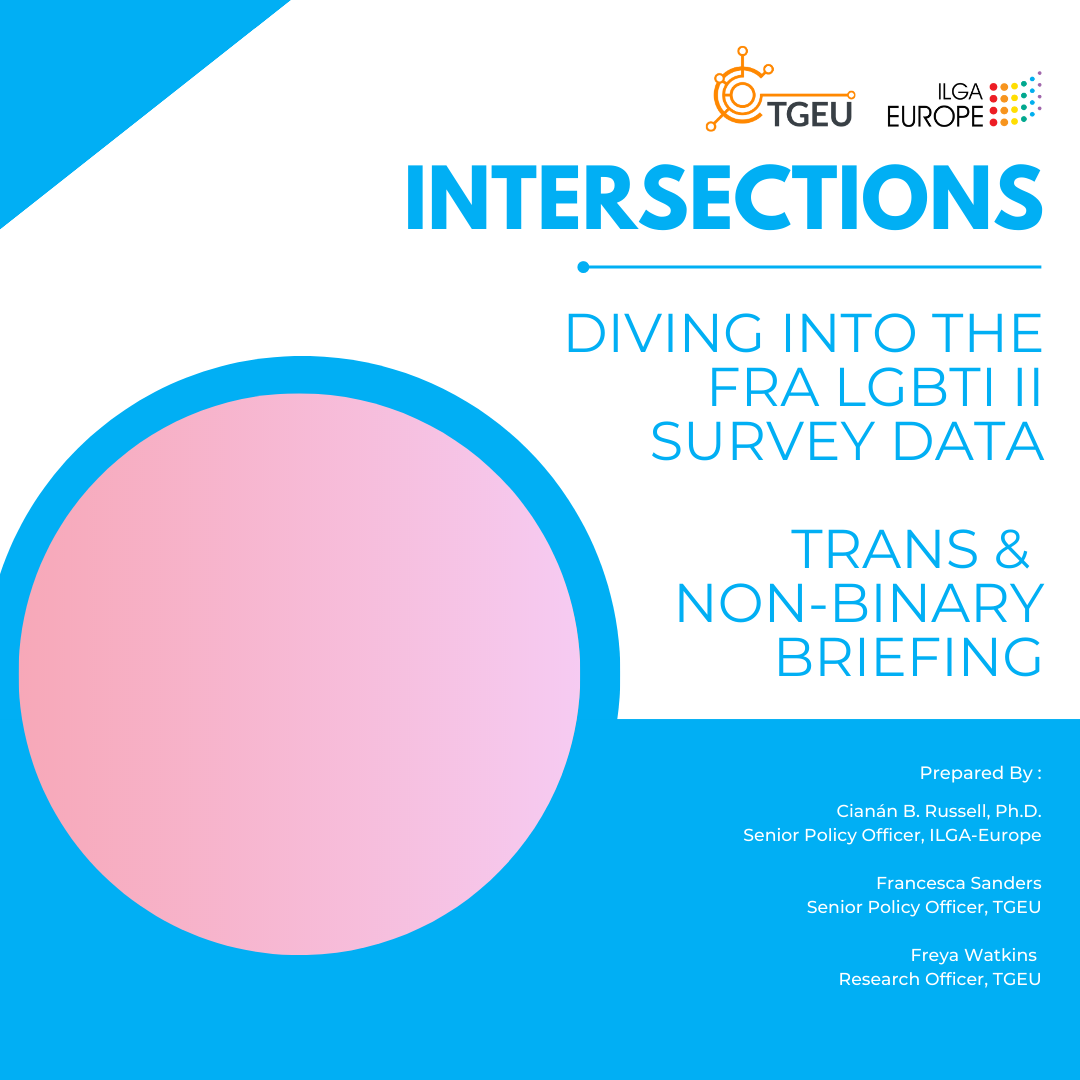
Disaggregated data, which can look deeply into the lived experiences of marginalised people, is a key demand of LGBTI and other human rights groups. With this in mind, over the last year ILGA-Europe have been partnering with a variety of NGOs in the region to analyse the FRA 2019 LGBTI Survey II data and pull out experiences of those experiencing intersectional marginalisation. This work is based on analysis co-commissioned by ILGA-Europe and TGEU.
This briefing on trans and non-binary people summarises the findings of data analysis disaggregating the responses of trans and non-binary people from the responses provided by all LGBTI respondents to the 2019 FRA LGBTI Survey II, in order to show the differences in their lived experiences. To understand the diverse challenges faced by trans and non-binary people, we created subpopulations of trans men, trans women, and non-binary people, and compared them with all respondents to the survey.
Despite limitations, this data set remains the largest available of trans and
non-binary people in Europe and provides a valuable insight into the experiences of a large number of trans and non-binary people across the EU. That it has been and will be repeated enables useful comparisons over time.
Statement on today’s vote to ban legal gender recognition in Russia
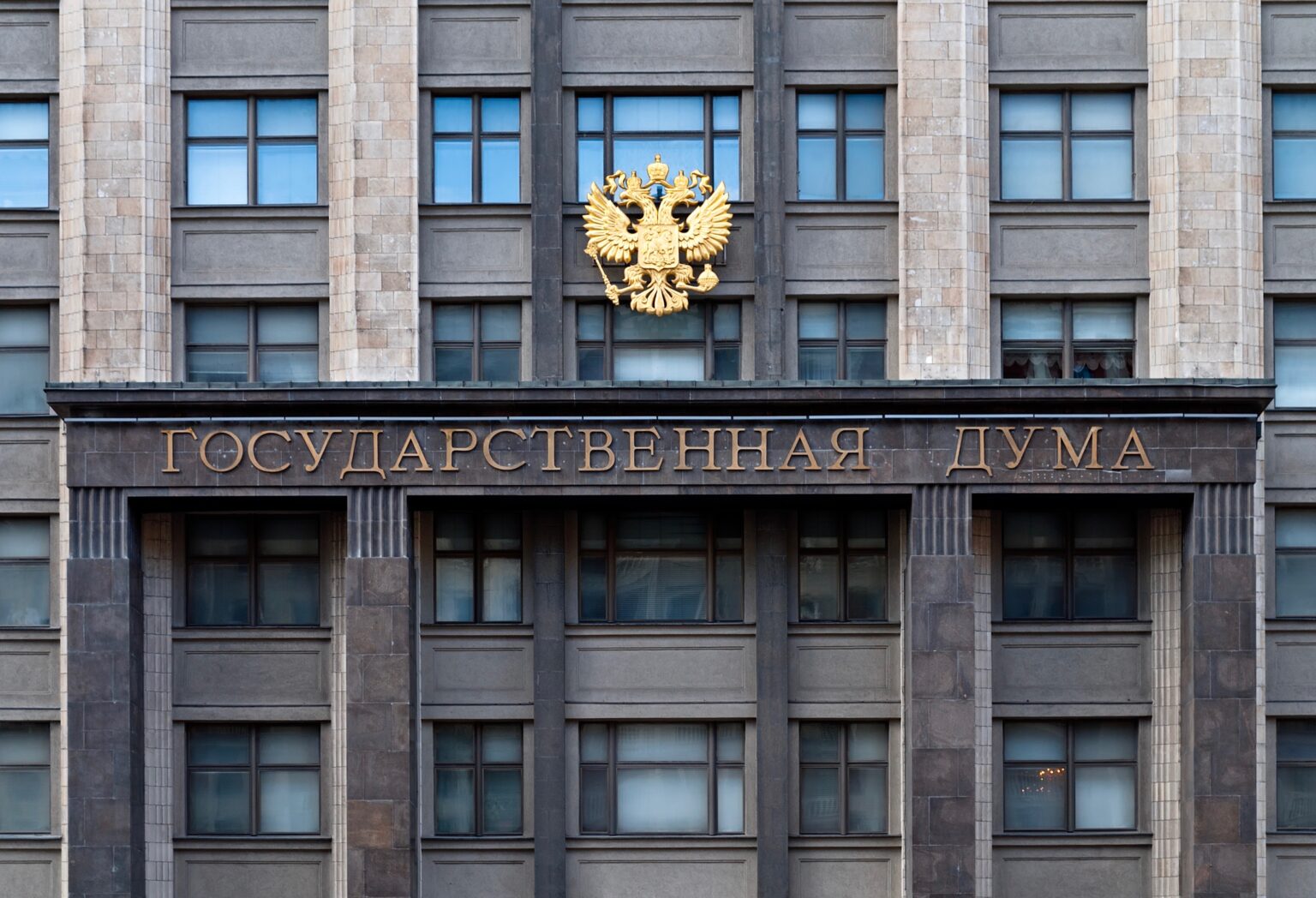
ILGA-Europe issue this public statement to express our support to and solidarity with trans and gender diverse people in Russia in the light of the recent legislative developments that severely infringe upon their human rights.
A proposed bill, passed in the third reading at the Russian Duma on July 14[1], introduces a comprehensive ban on trans-specific healthcare and legal gender recognition, effectively limiting individuals’ autonomy over their own bodies and identities.
We firmly assert that such legislation flagrantly violates fundamental human rights standards and principles.
ILGA-Europe firmly believe in the inherent dignity and equal rights of all individuals, regardless of their gender identity or expression. International human rights standards, including the Universal Declaration of Human Rights, emphasise that everyone has the right to self-determination, privacy, and the highest attainable standard of physical and mental health. Denying trans and gender diverse individuals access to trans-specific healthcare and legal gender recognition blatantly disregards the international human rights framework.
We stand in solidarity with the trans and gender diverse community in Russia, whose rights and wellbeing are under attack. The denial of trans-specific healthcare, including hormone therapy and surgeries, not only disregards the human rights of trans and gender diverse people but also perpetuates discrimination, stigmatisation, and marginalisation. It is essential to recognise that trans-specific healthcare is a critical component of comprehensive healthcare, promoting the well-being, mental health, and social integration of trans and gender diverse people.
Furthermore, the bill invalidates all certificates of legal gender recognition for individuals who have undergone transition-related surgery but not yet changed the gender marker in their passport. This is a violation of their right to privacy, places trans people in legal limbo, and creates unnecessary burdens on trans people, forcing them to disclose their private and medical history and exposing them to discrimination, harassment and violence.
Additionally, the prohibition on adoption and guardianship for trans and gender diverse people is a denial of their right to form a family and care for children in need. This discriminatory provision perpetuates harmful stereotypes and prejudices against trans and gender diverse parents.
This bill not only violates the rights of trans and gender-diverse people but also raises concerns about the wellbeing and bodily autonomy of intersex children and people, particularly in relation to intersex genital mutilation. International human rights bodies have repeatedly classified non-vital or cosmetic medical interventions against intersex infants and children without the child’s full personal, informed consent, otherwise known as “intersex genital mutilation” or “IGM”, as constituting cruel, inhuman, or degrading treatment or harmful practices. These practices violate the principles of bodily autonomy, non-discrimination, and the best interests of the child. They have been recognised as human rights violations that require urgent action and protection for intersex people.
The bill will now be voted in the Federation Council on July 19 and then needs to be signed by the President to come into force.
We stand united and in solidarity with our allies and partner organisations in demanding justice, equality, and dignity for trans, gender-diverse and intersex people in Russia. We will continue to advocate tirelessly for the full recognition of their human rights, including bodily autonomy, access to comprehensive healthcare, legal gender recognition based on self-determination, and the right to form families of trans and gender diverse people in Russia.
[1] http://duma.gov.ru/news/57524/
The Frontline: Trans Inclusion in the Women’s Movement

In this episode of The Frontline, specially released on Trans Day of Visibility, we’re looking at trans inclusion in the women’s movement. All too often we hear about exclusionary forces, or the voices of forces who seek to exclude trans women from the women’s movement, but does this adequately represent the truth?
We ask what it means for feminism to be inclusive in practical terms and how does inclusiveness impact the work? We explore how inclusionary women’s rights organisations and trans activists are responding to the efforts of exclusionary actors to narrow the frame for feminism, and the lessons learned so far.
With us to investigate exclusionary narrative and look at it from the more prevalent inclusionary perspective, are Caroline Hickson, Regional Director of International Planned Parenthood Federation European Network; Tanya von Knorring, Executive Director of Transfeminiinit, Finland and Federal Vice Chair of National LGBTI Finland; and Marion Böker from the German NGO, Deutsche Frauenring, who is also on the board of the International Alliance of Women and the European Women’s Lobby.
Romanian transgender man’s landmark case requesting that Romania acknowledges his UK gender recognition referred to the Court of Justice of the European Union
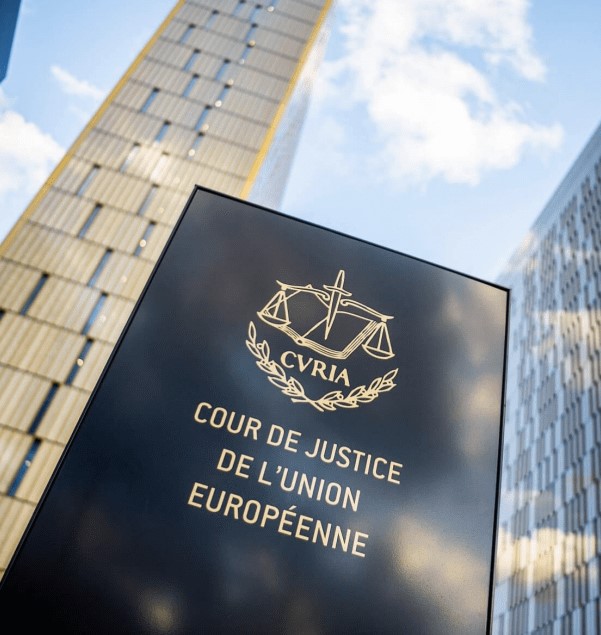
Arian Mirzarafie-Ahi, a transgender man with Romanian and British citizenship, has filed a first-of-its-kind lawsuit in Romania against Romanian authorities over their refusal to recognize his new male name and gender identity acquired in the United Kingdom (while still treated as an EU Member State). The lawsuit, which raised fundamental questions under EU law, has now been referred to the Court of Justice of the European Union (CJEU) in Luxembourg.
ACCEPT Romania, a leading Romanian NGO for LGBTQ+ rights, is helping Arian bring this landmark legal claim before the CJEU to have his new gender identity acknowledged in Romania, in accordance with his free movement and citizenship rights.
Arian began the legal process to change his gender identity markers and name in 2016. He was ultimately granted a gender recognition certificate by the UK authorities in 2020, during the Brexit transition period (when the UK was still treated as an EU Member State).
Romania now refuses to acknowledge the name and gender recognition that Arian received in the UK. Instead, it is demanding that Arian undergo Romania’s own gender recognition procedure, which has already been found to violate the European Convention on Human Rights. As a result, Arian now finds himself with two different identities across two countries, which has impacted his well being, his freedom of movement, and his EU citizenship rights.
This situation is humiliating and deeply affects Arian’s right to dignity under the Universal Declaration of Human Rights and the European Convention on Human Rights. Arian’s ability to travel freely in the EU, like any EU citizen, has been unjustifiably restricted, including his ability to visit family members in Romania, because his Romanian passport displays the wrong identity.
Arian’s case is the first of its kind to reach the European Courts. He hopes the CJEU will side with him and rule that the Romanian authorities should acknowledge his UK gender recognition and issue him new identity documents with the correct name and gender, without subjecting him to the full Romanian gender recognition procedure.
This case could set a precedent for other transgender people whose gender recognition in one Member State is not being acknowledged elsewhere in the EU, harming their ability to travel freely, reside, work or study across the EU, or even to vote.
The Court will also have the opportunity to confirm that the rights that EU citizens lawfully acquired in the UK when it was still treated as a Member State, such as Arian’s gender change, are portable when those citizens wish to exercise their free movement rights.
Arian and ACCEPT are represented by human rights lawyer Iustina Ionescu and assisted by leading international law firm White & Case on a pro-bono basis.
The facts of this case are as follows.
Background to the case
Arian was born in Romania and migrated to the UK in 2008, and later gained dual citizenship. He started the medical and legal transition in the UK in 2016 at the age of 24, and obtained a UK gender recognition certificate in June 2020, when the UK was still treated as an EU member state.
Arian attempted to register his name and gender change with the Romanian authorities in 2021, but his request was denied. Instead, the Romanian authorities demanded that Arian undergo the full Romanian gender recognition procedure before the national courts. That procedure has already been found to be in violation of human rights by the European Court of Human Rights (X and Y v Romania).
Arian then filed lawsuits in the Romanian national court against the Directorate for the Persons’ Records in Cluj, Romania; against the Civil Status Service, the Directorate for the Persons’ Records and the Administration of Databases and against Cluj Municipality represented by Emil Boc, over their refusal to change his identity documents through a simple administrative procedure.
Through this legal action, Arian is requesting that the national courts oblige the Romanian authorities to change his gender and first name, as well as to issue a new birth certificate.
Before Brexit, Arian could have travelled based on his British passport that reflects his gender identity. However, since Brexit, he can exercise his EU citizen rights only through his Romanian identity documents, which do not reflect his gender identity.
Alongside this breach of Arian’s fundamental rights, especially his right to free movement and residence in the EU, this disparity between his Romanian and British documents exposes him to humiliation and discrimination.
Arian has to travel to the EU with a Romanian passport that reflects neither his gender identity nor his appearance, or must travel on his UK passport as a non-EU citizen.
Considering that Arian’s case raises new issues of principle requiring the interpretation of EU law, in particular in relation to free movement rights and EU citizenship, the Romanian court has decided to refer the case to the European Court of Justice for a preliminary ruling. After hearing the parties, both in writing and orally, the Court of Justice will render a judgement that will be binding on the Romanian courts and throughout the EU.
Quotes
Arian said: “My entry into Romania’s territory, the country where I was born and where I have family members that I want to visit, depends on a set of identity documents that do not reflect who I am.
Due to the Romanian State’s refusal to recognise my gender identity and issue updated documents, I have already been a victim of discrimination at Romanian airports.
“All that I want is to be respected as a Romanian and European citizen and to have my Romanian identity documents updated, just as my UK documents were when I transitioned. I want to be able to enjoy all my rights, but especially my right to dignity.”
His lawyer, Iustina Ionescu, said: “The Romanian state once again violates European law and disregards the efforts made by a Romanian citizen to obtain the recognition of his gender identity in another EU Member State.
“For over a year and a half, the Romanian civil status authorities have sent Arian on a fool’s errand – they have forced him to once again go through a procedure that is entirely random in Romania, and that has already been declared by the ECtHR as violating human rights, and that does not guarantee him a solution of the situation.
“Before being European citizens, we are Romanian citizens, and the state should do its duty towards all its citizens. Fortunately, we can turn to European justice to ensure that we receive equal treatment without discrimination. The European Court of Justice has ruled many times that EU member states should refrain from taking decisions that restrict free movement and the rights of EU citizenship, as Romania did in this case.”
Florina Presadă, executive director of ACCEPT, commented: „ACCEPT Association has been working for years to put an end to the discrimination and abuse that the Romanian state subjects transgender persons in Romania by not providing a legal gender recognition procedure and all services required so that transgender persons can exercise their right to self-determination.
We have been providing legal counselling, psychological support and guidance in transition for years for transgender Romanian citizens, and we have also supported strategic litigation cases in order to show, beyond any doubt, that the rights of transgender persons in Romania are being violated. Our goal is to put an end to the current laws, policies and practices leading to the discrimination of transgender persons.
We stand by Arian, as we stand by every transgender person in Romania and in any other EU member state that does not recognize these persons’ rights to self-determination and dignity. We hope this ruling will show that European rights are for everyone, regardless of gender identity or expression.”
Patrick Brăila, trans activist, declares: “Among the Romanians who left for other European countries for a better life, there are also transgender Romanians who work and live in these states, where they managed to obtain citizenship and which became their adoptive countries. One of them is Arian, a Romanian and British citizen, whom the Romanian state humiliated and wronged when it did not recognize his identity and put him in abusive and intrusive situations. We trust that the CJEU will give him justice, thus restoring the dignity of both him and other trans people who know that their rights as European citizens can no longer be violated.”
“To paraphrase Ursula von der Leyen, if you are trans in one member State, you are trans in all member States. This needs to be settled once and for all,” comments Lenny Emson, TGEU Executive Director. “Having to go through the ordeal of having your gender identity vetted several times is unfair and puts trans people at a clear disadvantage when compared to others living in the EU. Romania, in particular, has no quick, transparent, and accessible legal gender recognition procedures, as confirmed by the European Court of Human Rights. We are proud of Arian for claiming his right to enjoy his EU right to freedom of movement.”
Katrin Hugendubel, Advocacy Director at ILGA-Europe added: “This case is just one example of what trans people in the EU have to go through when their gender recognition from a Member State is not recognised in another, forcing them to undergo the full legal recognition procedure again. This is particularly difficult and troubling in those countries that lack an LGR procedure in conformity with international human rights law standards. This judgment from the CJEU will establish a clear obligation to recognise gender recognition from one Member State in another. It will rightfully enable trans people to move freely across the EU, and to enjoy EU citizenship rights on equal footing with everyone else.”
For further information and interviews, please contact Diana Dragomir, Head of communication & PR ACCEPT Romania at diana@acceptromania.ro or Florina Presadă, Executive Director of ACCEPT Romania at florina@acceptromania.ro.
#TDoR2022: Two more European countries added to annual report on trans murders
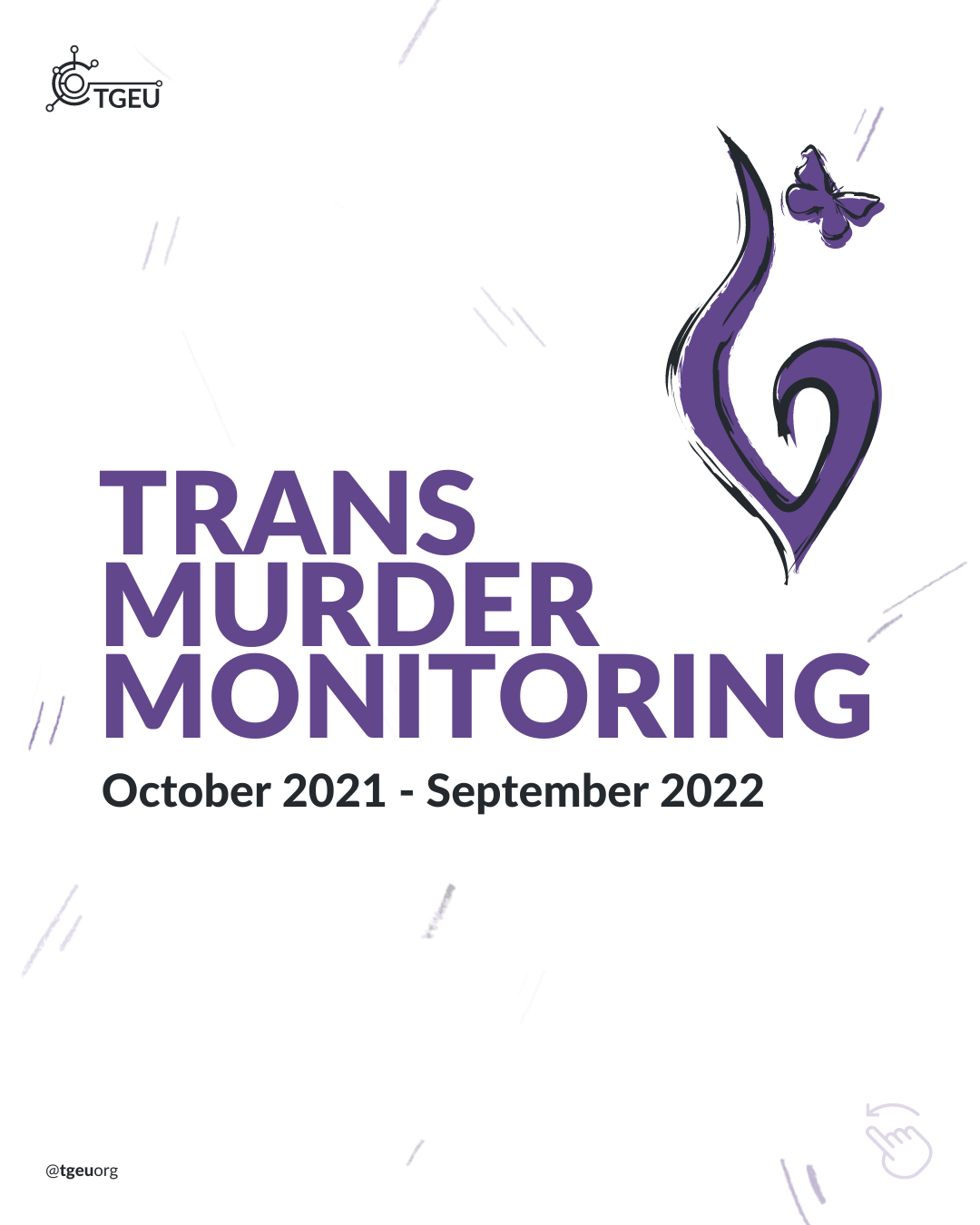
This year, for the first time, Estonia and Switzerland reported the murders of trans people. In total, the last twelve months saw 327 reported murders of trans and gender-diverse people in the world as a result of anti-trans violence, according to TGEU’s Trans Murder Monitoring. Although TGEU has been collecting information since 2008, most trans murders still go under-reported.
Sabrina Houston and Cristina Blackstar were both migrant, black and trans. They were both stabbed to death in their own homes earlier this year. They are two of the 327 reported murdered trans and gender-diverse people across the globe, according to the latest Trans Murder Monitoring report, published by TGEU in advance of Trans Day of Remembrance.
Trans Day of Remembrance (TDoR) is marked each November 20 to commemorate trans people whose lives were lost as a result of anti-trans violence. Sabrina and Cristina had their lives cut short in two countries that have not reported victims before: Sabrina was murdered in Taillin, Estonia and Cristina in Lausanne, Switzerland.
As with 96% of reported victims, Sabrina and Cristina were trans women or femmes. They were also racialised, as were 65% of the cases with data on race and ethnicity. Coming from Jamaica and Brazil respectively, Sabrina and Cristina were migrants, as were 36% of the trans people reported murdered in Europe. France, Georgia, Germany, Italy, the Netherlands, Sweden, Turkey and the United Kingdom are the other European countries which have reported victims too. In total, 14 victims were reported in the region, same as last year. With 222 cases, Latin America and the Caribbean continues to be the region reporting most of murders of trans people. No victims were recorded in Central Asia.
More key figures:
- Half of murdered trans people whose occupation is known were sex workers;
- 35% of the murders took place on the street and 27% in their own residence;
- Most of the victims who were murdered were between 31 and 40 years old.
Altogether, the data continues to indicate a worrying global trend when it comes to the intersections of misogyny, racism, xenophobia, and hatred against sex workers, with most victims being Black and migrant trans women of colour, and trans sex workers. According to TGEU, these numbers are just a small glimpse into the reality on the ground. Most cases continue to go un-reported and, when reported, receive very little attention. “The Trans Murder Monitoring exists not only to highlight the horrific murders of trans people worldwide,” says Lukas Berredo from TGEU “but also to show the need to ensure that the voices of the most marginalised in our communities are heard and amplified.
Hundreds of trans and gender-diverse people are killed each year around the world as a result of transphobic violence. The murders of Sabrina and Cristina come at a time when anti-trans and trans-exclusionary rhetoric is on the rise in European countries. Decision makers must take a stance against anti-trans forces and in defence of human rights, so that everyone can enjoy their life in equality, freedom and safety.
Briefing Document: Ukraine war – Medications needed by trans and intersex people

The ongoing crisis in Ukraine has resulted in need for immediate action to address the needs both of a significant population of Ukrainians fleeing the fighting as well as for those who are staying in Ukraine. Within both of these populations, trans and intersex people can be found, and their unique healthcare needs must be taken into account in the humanitarian responses. The purpose of this briefing is to describe the medical needs most common among trans and intersex people, including the medications that they will need, and to document emerging issues in Ukraine and surrounding countries on these issues.
Trans Day of Visibility 2022: Here’s what you absolutely should know about trans communities from Ukraine

It’s March 31, Trans Day of Visibility. To mark this day, at ILGA-Europe we want to commend the amazing work trans-led organisations are doing as the war in Ukraine continues, and tell you about the current needs of trans communities staying or leaving the country.
After over a month of war, Putin’s invasion of Ukraine has devastated several cities and caused the displacement of almost four million people and counting. Trans people are among those affected: there are trans women who have tried to leave but couldn’t due to the male gender marker in their passports, and trans people who want to stay but are at risk of violence in regular shelters, and all are exposed to potential shortages or difficulties in accessing medicines and hormones on both sides of the border.
Trans-led groups and organisations are responding to the humanitarian crisis by doing an incredible job to support trans people in Ukraine and neighbouring countries. Here are some of the current needs of trans people from Ukraine and how trans-led organisations are responding:
Trans people staying in Ukraine or leaving — what are their needs?
- Many trans people in Ukraine do not have identification documents with gender markers matching their gender identity. So trans women often still have a male gender marker. In this situation, many of those who have tried to flee have been refused to pass internal check-points and to leave the country as due to their identity documents, they fall under the martial law and military mobilisation of men between 18–60. Trans women need a pathway to be able to leave the country along with other women, including those who have a male gender marker in their documents.
- Trans people and other LGBTI communities who are staying in Ukraine because they want to, or because they cannot leave, are at risk of discrimination and violence in regular shelters. The few existing LGBTI shelters have very little capacity.
- Necessary hormones and medicines for trans and intersex people, as well as HIV/AIDS medication are, like other supplies, running out in Ukraine. Humanitarian aid packages generally do not include these medicines, and trans, intersex, and LGBTI civil society groups in neighbouring countries are working hard to fill this gap in the short-term. It is imperative that medicines are available for trans communities in Ukraine and for refugees in arrival countries.
- When trans refugees arrive in neighbouring and other reception countries, many may experience delays and inconsistencies in access to healthcare, which could lead to an interruption in their care. This can be potentially devastating. Governments in reception countries must enable access to healthcare for refugees and ensure that trans and intersex people already taking medicines can continue care without interruption.
Many trans-led organisations are doing amazing work to help and support their community members from Ukraine. Have a look:
In Europe, TGEU is monitoring the situation, providing frequent updates and resources, as well as how best to provide support, guidance for trans people from Ukraine, and visuals for social media channels, here.
In Ukraine and Slovakia, Trans*Generation is providing legal consultation and connections to trans people who want to cross the border, as well as information about visas abroad, hormones and medication and financial assistance to trans people staying and leaving Ukraine. Find out more here.
In Hungary, Transvanilla is supporting trans refugees crossing the border by providing transport, accomodation, translation and accompaniment in administrative procedures. Learn more about Transvanilla here.
In Poland, intersex organisation Fundacja Interakcja is supporting trans and intersex refugees. Learn more here.
A Marathon, not a sprint: how we’re responding to the invasion of Ukraine

In the past week, since Russia invaded Ukraine on February 24, the global response has been massive, alongside a great number of organisations working with LGBTI communities in the country, and in countries where refugees are landing.
At ILGA-Europe, we’re working to immediately help vulnerable people, but we’re looking towards the long-run too.
As the war in Ukraine has become the focal point of the world, there is a rush to help people and organisations in the country, and rightly so. As many staying in Ukraine seek safety and survival support, while a million and counting continue to cross borders into neighbouring countries and chances for people to leave become slimmer by the day, an immediate humanitarian response is absolutely necessary
At ILGA-Europe we have been working in this respect, helping people on the ground as best we can through our connections with LGBTI organisations, but we recognise that this is not going to be a short-term situation for vulnerable people in Ukraine, Russia and neighbouring countries.
We recognise that this is a marathon, not a sprint, and that efforts across the board to help are complex and will become more so as time goes on. With that in mind, here are the elements of our work, which began in the days leading up to February 24, and are continuing.
Funding
We have shifted a major proportion of our re-granting funds to give emergency help to LGBTI organisations on the ground in Ukraine to help people in the country find safety, food and shelter. We are also shifting funds to LGBTI organisations in neighbouring countries to help get LGBTI refugees into proper living conditions and help them acclimatise.
Working with other funders
We are coordinating with other organisations who are doing fundraising, as well as with our funders to join them up with the right organisations in Ukraine and neighbouring countries, where the funds they raise can do most good.
Directing individual fundraising to the organisations that urgently need it
We are building a list of organisations in Ukraine and neighbouring countries working directly with LGBTI people and communities, which can be found here. This is a growing list, and the information is as accurate as possible.
Connecting those who are mobilising
We have set up various communication channels to connect those who are helping people get into safety and ensure quick coordination around emerging needs.
Working with our member organisations in Ukraine, Belarus and Russia
Although it is difficult to have day-to-day contact with LGBTI organisations in Ukraine, we are doing our utmost to keep the flow of contact with them going, so that we can work to support them in whatever way we can, based on their needs. We are in day-to-day contact with our member organisations in Russia and Belarus, where repression to civil society has intensified, to support them in whatever way we can, based on their needs.
Advocacy on Medical Provisions
Currently one of the paramount issues is making medications available for trans, intersex and people living with HIV. We are assessing needs and working to target the World Health Organisation, governments and the pharmaceutical industries, advocating on behalf of those in need.
Advocacy for Refugees
We are providing information about EU regulations adopted on temporary residency for refugees now, and using our channels with EU institutions and agencies, as well as with national governments to see how we can make sure that all refugees are respected at borders, including BPOC, people with non-Ukrainian passports and trans people.
Together with Transgender Europe (TGEU), we are raising awareness about the specific vulnerable situation for trans women in Ukraine who do not have a female gender marker on their passport. Many are trying to leave the country but cannot, due to the general mobilisation. We are seeing how we ensure support of such cases and raise awareness of this situation of extreme vulnerability.
We have our communications channels open non-stop for LGBTI organisations who need help, or wish to help. In the meantime, we recognise that while much of our immediate work has turned towards the war in Ukraine, we are figuring out ways to continue to be responsive to increasingly complex, and daily changing circumstances, while continuing to give our attention to other crucial elements of our work for LGBTI people across Europe and Central Asia.